Shree Mahavir Bhagwan: Life Stories of the Twenty-fourth Tirthankara
Shree Mahavir Swami was the last and the 24th Tirthankar of the current time cycle. His symbol (lanchan) is that of a lion. Of the 24 Tirthankars , He had the most adversities. He had to face a lot of severe karmas. In general, Tirthankars do not face karmas with the same intensity that Lord Mahavir had to face. Despite this, He always remained steadfast and finished each karma with equanimity.
His courage was unmatched, and hence, He was called ‘Mahavir’.
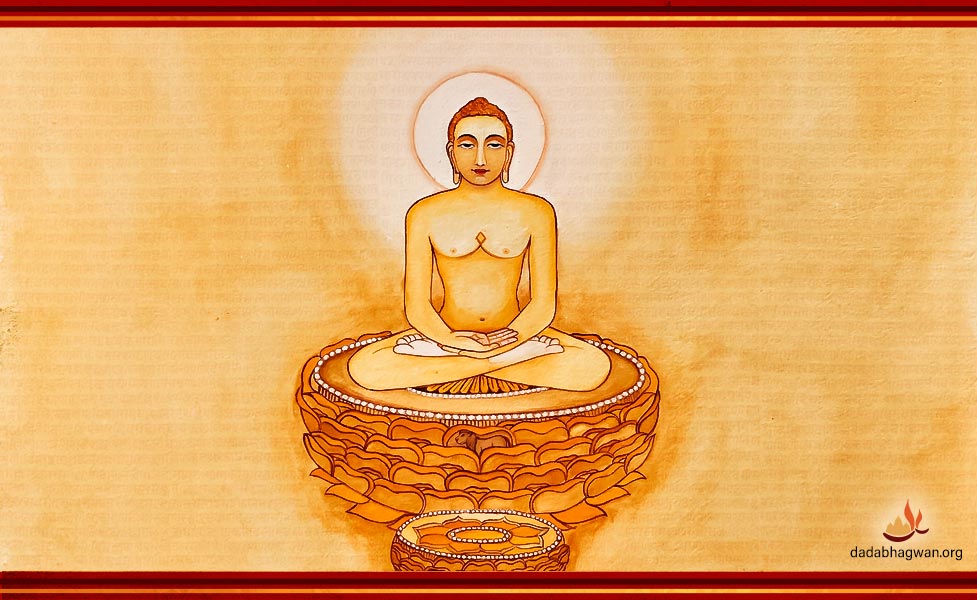
A lot of wonders of the world occurred during His reign. When He attained nirvana, the 4th era of the current time cycle was about to end and the 5th era was about to begin.
We can learn a lot from Bhagwan Mahavir and His previous births. So let us read about the life stories of Mahavir Swami with a pure heart.
The scriptures have revealed the previous 27 births of Lord Mahavira . Of those 27 births, His first birth was of Naysar, in which He achieved the right Vision (Samyak Darshan or Self Realization). This birth marked the beginning of His spiritual journey, which became complete in His 27th birth.
The First Birth
Naysar was a woodcutter. He was a very religious and pious person. He used to do a lot of manual labour in the jungle. He cut wood and gave it to the King for use in the kingdom. He was very poor, but generous at heart. He heartily helped anyone he met. Every day, before he ate, he would look for someone who needed food. He would only eat after having fed such a person.
While cutting wood in the jungle, it so happened that he once saw a group of Sadhus passing by. A Sadhu is someone who has attained Self Realization. It is one of the five levels of enlightened beings (panch Parmeshthis) to whom we pay our obeisance when we recite the Navkar Mantra.
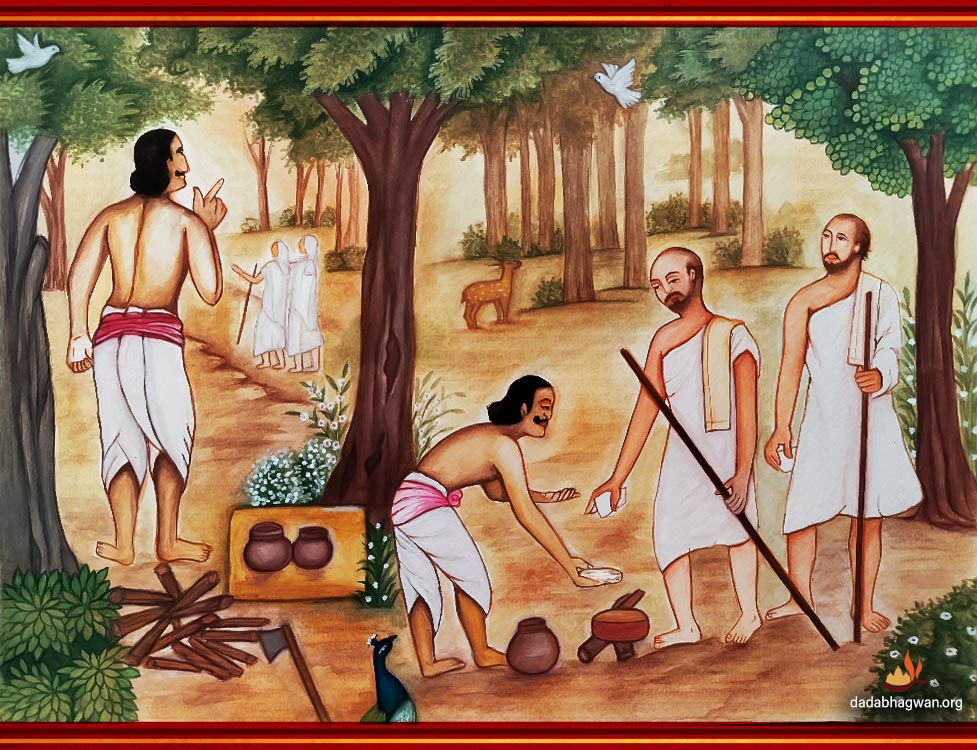
The sadhus had lost their way in the jungle. It was lunch time. So, Naysar approached them and insisted that they eat. He served the sadhus with a lot of love and devotion. In return, the sadhus taught him about true religion. Because of his noble virtues such as being respectful towards everyone, feeding the hungry with love and serving the sadhus with great devotion, Naysar attained samkit, also known as samyak darshan or Self Realization. He experienced that, “I am the permanent Soul and the mind, speech and body are all temporary.” His inner vision changed, the right belief to see temporary things as temporary and permanent things as permanent was established within him.
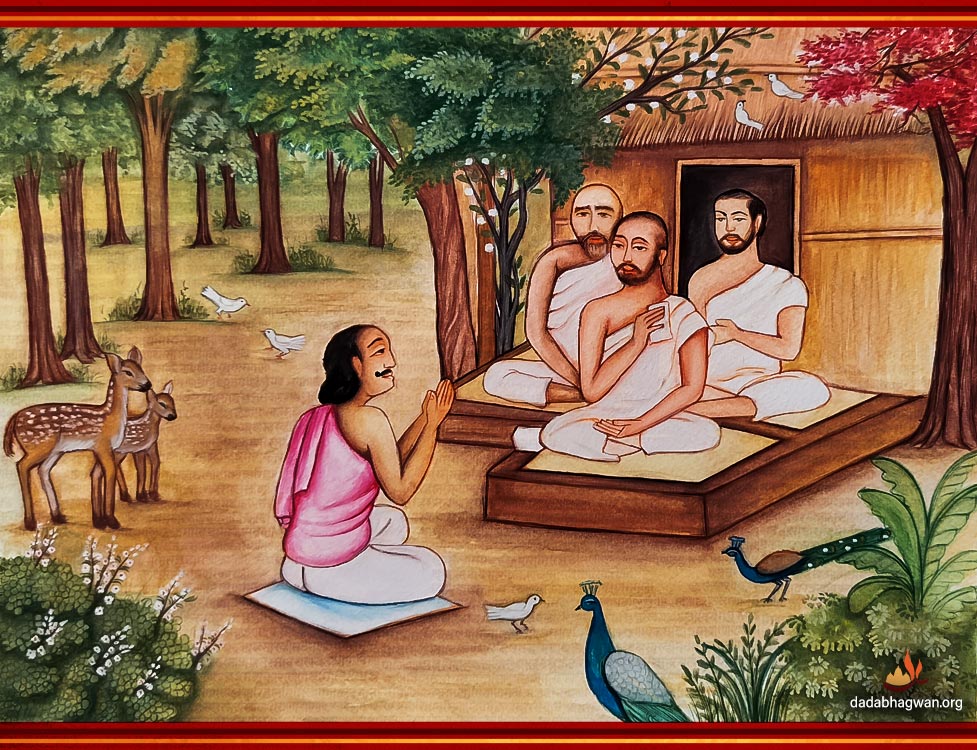
From the moment one attains samkit, a person’s worldly life ends and their journey on the path of liberation begins. Until this right vision is not attained, it does not matter how much one chants, fasts and meditates, one keeps getting caught in the vicious cycle of birth and death due to the binding of karmas. Self Realization is only possible when one finds a Self-realized person or a Gnani; so, one should always seek a Gnani. Then, one day, like Naysar, we too will be able to attain Self Realization.
The Second Birth
Because of his good deeds, Naysar, in his next birth, was born in the celestial world.
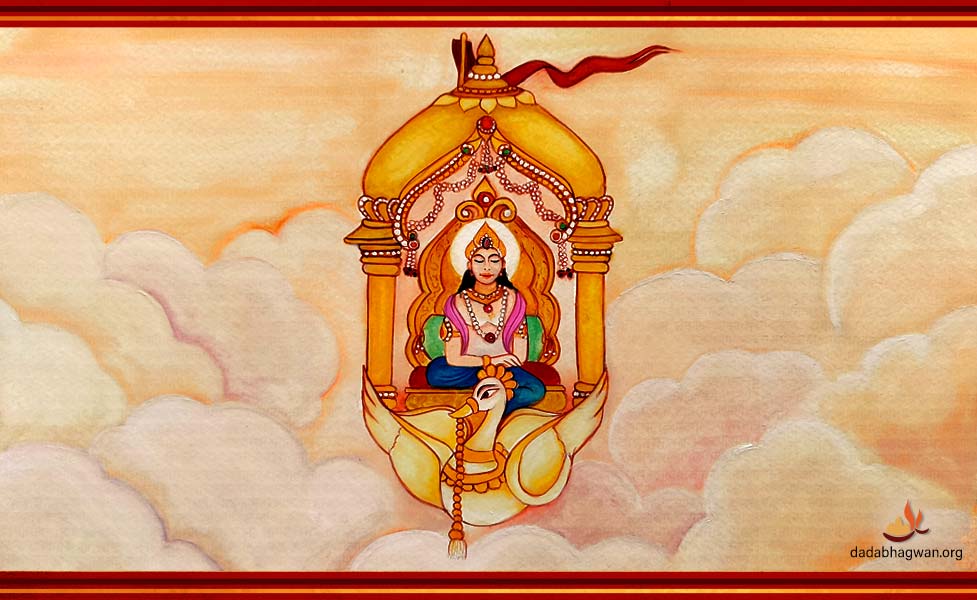
The Third Birth as Marichi and Other Twelve Births
Thereafter, he was born as Marichi, the grand-son of Rushabhdev Bhagwan (the first Tirthankar of the current time cycle) and the son of King Bharat. When Lord Rushabhdev took Diksha, imitating Him, Marichi also took Diksha from the Lord. However, he could not endure the strict rules of conduct, severe penance, etc. laid out for Sadhus. Therefore, he established a separate religious sect called Tridandi, whose rules were somewhat relaxed compared to that prescribed for Sadhus. Despite establishing his own sect, he continued to travel with Rushabhdev Bhagwan.
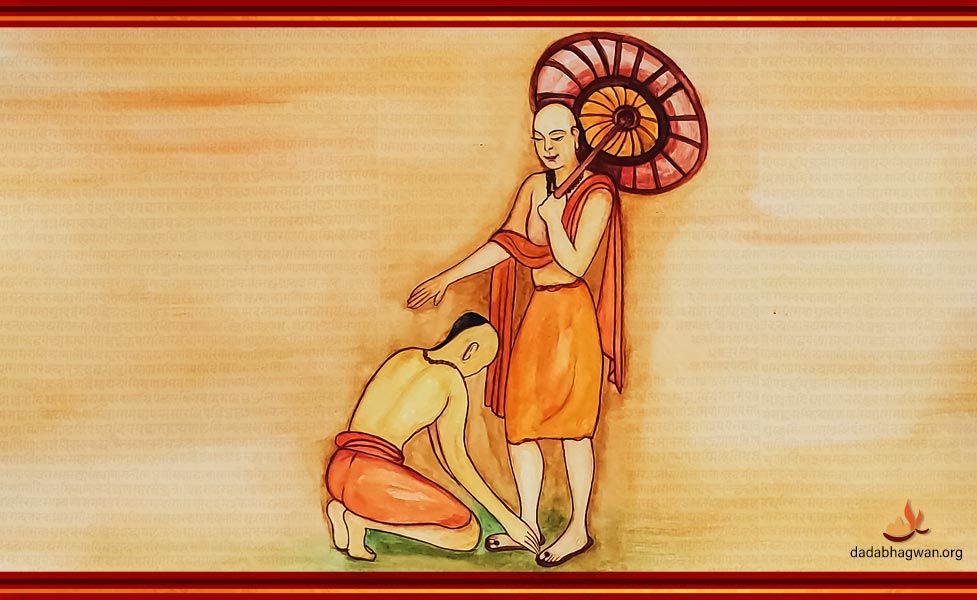
On one occasion, King Bharat asked Lord Rushabhdev who else from their family would become a Tirthankar. Bhagwan was keval Gnani; hence, He had the knowledge of everything. So, He replied that from our family, your son Marichi will become the final Tirthankar of this Chovisi. Not only that, before becoming a Tirthankar, he will be the first Vasudev of this time cycle and will also become a Chakravarti. Hearing this, King Bharat was very happy. He went to Marichi, bowing down, he said, “I am not bowing down to you because you have renounced the world. However, I am bowing down to you because in the future you are going to become the last Tirthankar, and before that you shall also become a Vasudev and a Chakravarti.” Upon hearing this, Marichi felt very proud that, “I was born into such a great family wherein my grandfather is the first Tirthankar, my father is the ruling Chakravarti, and I am going to become a future Tirthankar.” Because of this, he binds karma.
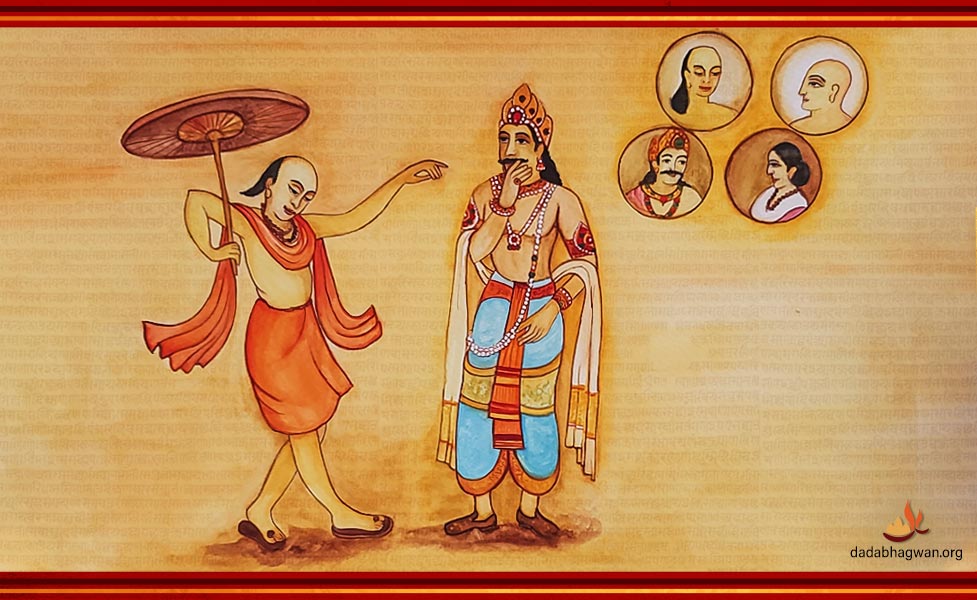
Although Marichi was part of the Tridandi sect, he preached the religion that Bhagwan Rushabhdev laid out. He would direct those who desired to take Diksha from him to Lord Rushabhdev and suggested that they take Diksha from the Lord. After Lord Rushabhdev attained nirvana, someone who desired to become his disciple, asked him, “What is the difference between Bhagwan Rushabhdev’s and your preachings?” Out of the greed to gain one disciple of his own, Marichi replied to him, “The religion that is there, is the same religion here too.” Because of this false statement, he bound karma as a result of which he had to take multiple births; births as a Brahmin and births as a male celestial being in the celestial world. This cycle continued for a long time.
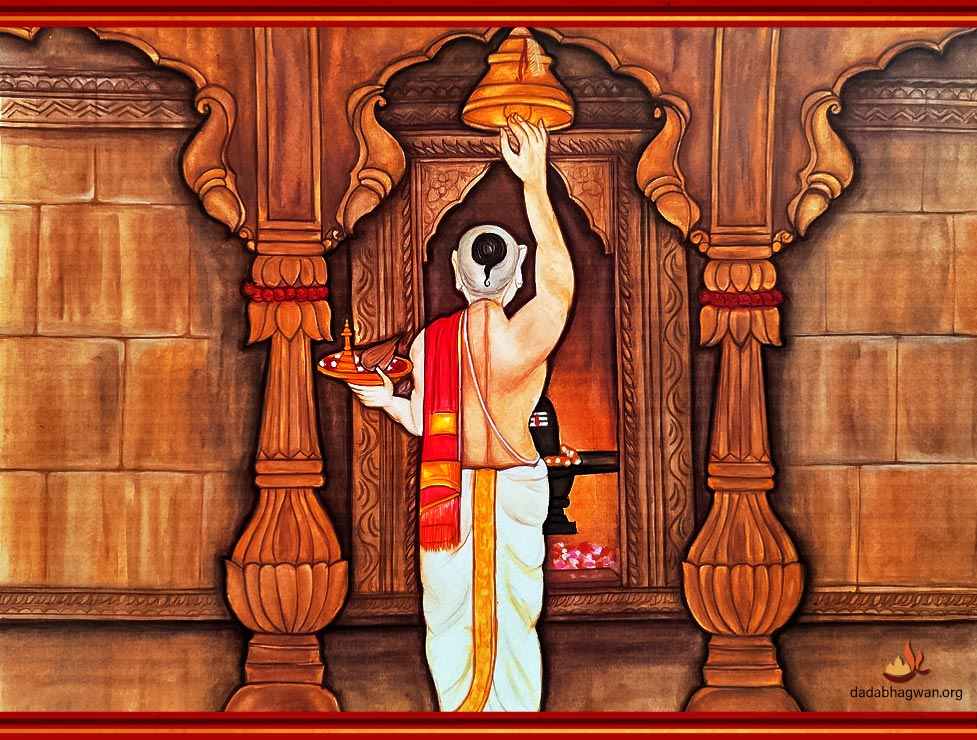
His Sixteenth Birth as Vishwabhuti and His Seventeenth Birth in the Celestial World
He was born as Prince Vishwabhuti in the city of Rajgruhi (now known as Rajgiri). His cousin brother was Vishakhanandi, whose father was the King. The two brothers were not very attached to each other; of the two, Vishwabhuti was more powerful.
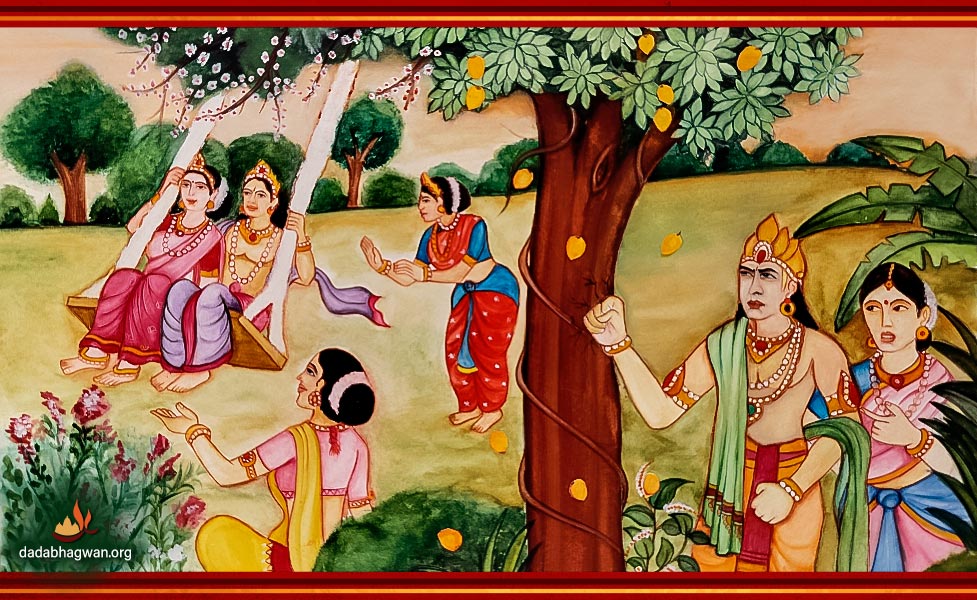
Once Vishwabhuti, accompanied by his Queens, went to a famous park, which was his favourite place. A little while later, Vishakhanandi went there with his Queens. Now, according to their family’s tradition, if one prince is in the garden, then the other is not allowed to enter. So, Vishakhanandi didn’t mind waiting outside for his turn. But, when one maid saw Prince Vishakhanandi waiting outside, she went and falsely instigated Vishakhanandi’s mother. The maid said that, even though you are the Queen, your son had to wait outside for his turn. Hearing this, the Queen was very angry. She told her husband to get Vishwabhuti out of the park immediately.
To fulfil the Queen’s wish, the King played a dirty game with Vishwabhuti. He told Vishwabhuti that one of their Subordinate Kings had revolted and refused to accept him as the King. So, he would have to wage war against him and make him submit. Vishwabhuti told his uncle to rest and proposed that he go and fight on his behalf against the Subordinate King. The King agreed. So Vishwabhuti left to make all the preparations to wage war against the Dissenting King.
However, there was no limit to his surprise when, the Subordinate King gave him a warm welcome and said that from his side there was no question of dissent. Vishwabhuti returned and narrated this to the King. Thereafter, when he went back to his favourite park for recreation, he saw that his cousin was there with his Queens. Therefore, as per family tradition, he could not go inside. He understood the whole game, that the King played with him. All this made him angry. With a lot of anger, he hit a nearby tree, and said that, “You are my close relatives, or else I would have crushed all of you like this.”
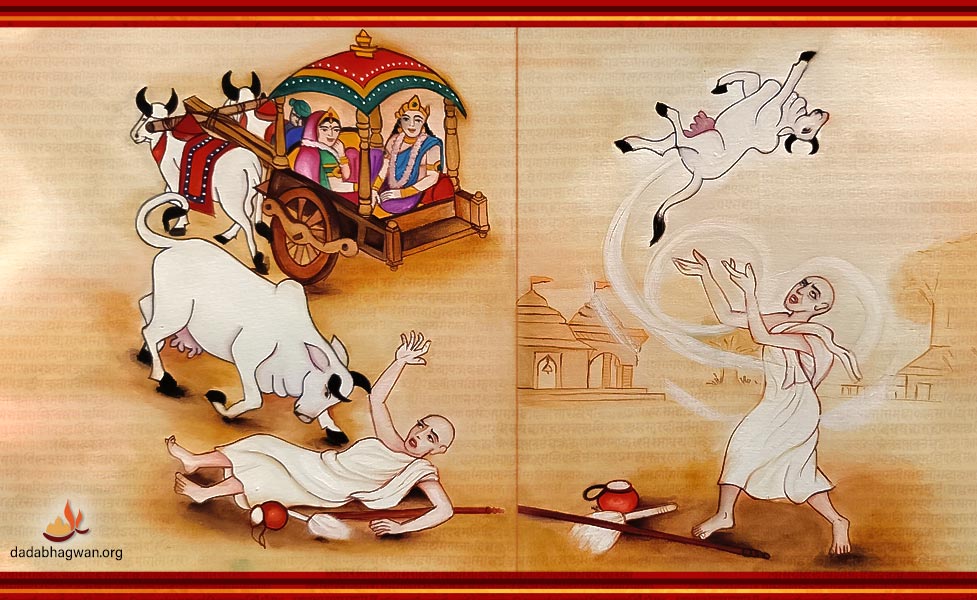
He developed dispassion towards the worldly life and immediately renounced it. He went to a forest and did a lot of penance there. After many years, he passed by a place where Vishakhanandi had come to attend his cousin's wedding. They saw each other, but just then a cow hit Vishwabhuti and he fell there. Vishakhanandi mocked him with bitter words, “You are so powerful that you can crush us all, and one cow has knocked you over, so where has your strength gone?” With that, everyone present started laughing at him. This mockery made Vishwabhuti very angry. He forgot about all his penance and renunciation and grabbed the cow, and as a show of strength he smashed and crushed it. Then, he left there but he was unable to forget the mockery from his brother, Vishakhanandi. And because of that, he resolved to take extreme revenge towards Vishakhanandi in his next birth. Because of his great penance, his next birth was in the celestial world.
His Eighteenth Birth as Tripushtha Vasudev
After completing his lifespan in the celestial world, Vishwabhuti’s next birth was as Tripushtha Vasudev in Bharat Kshetra.
Once King Prajapati’s wife, Queen Bhadra, had four dreams which indicated that their son would take birth as a Baldev, whom they named Achalkumar. Later, King Prajapati’s second wife, Mrugavati, had seven dreams indicating that she would give birth to a Vasudev who would become a very powerful King. The parents named Him Tripushtha. As a rule, Baldev’s and Vasudev’s are always brothers from different mothers, and the love they have for each other is unparalleled in this world. And so, even Prince Achalkumar and Prince Tripushtha had a lot of love for each other. From a young age, they both quickly learned different types of knowledge and skills.
On the other hand, Vishakhanandi was born as the Prativasudev. His name was Ashvagriva and he was a very powerful King. He had 16,000 Subordinate Kings under him. Once, a savage lion, whose name was Kesari, caused so much violence in the kingdom, due to which, Ashvagriva announced that all his Subordinate Kings will have to take turns, one after another and protect the kingdom from the savage lion.
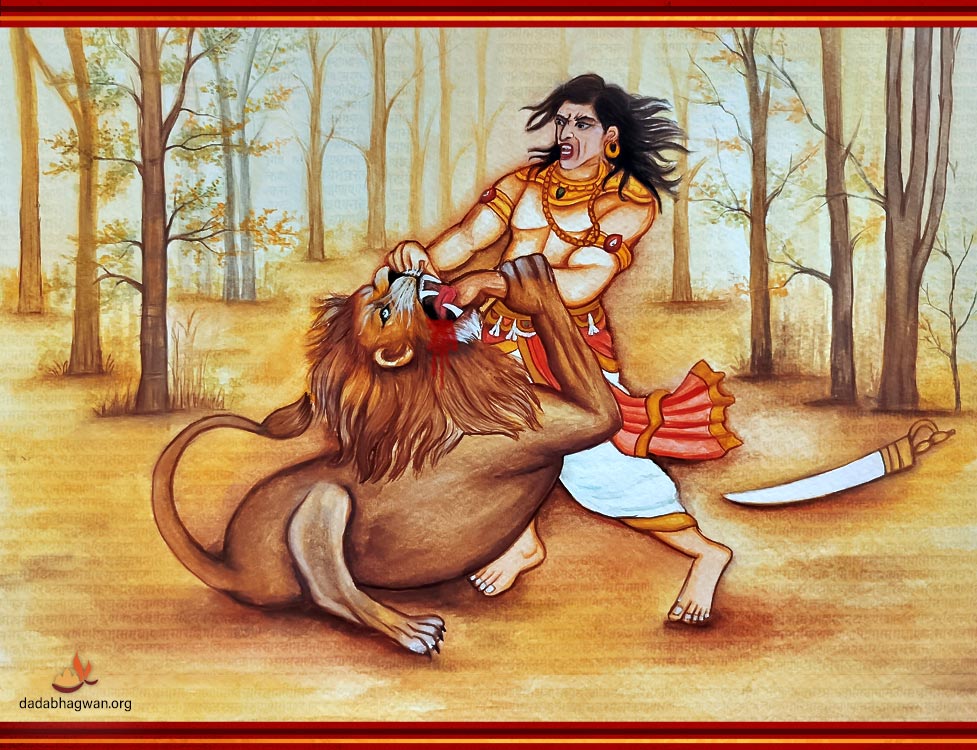
Hearing this, Prince Tripushtha asked his father permission to represent him to fight against the lion. Then he went and ripped open the lion’s mouth in an instant. The lion was in a lot of pain and was angry with Tripushtha. Although, Tripushtha’s charioteer did calm the lion down and helped him die in peace. In a later birth, this charioteer took birth as Gautam Swami, who was the first Ganadhar of Mahavir Swami.
Ashvagriva learned of a prophecy which predicted that he would die at the hands of Tripushtha. Therefore, Ashvagriva waged a war against Tripushtha to destroy him first. However, in that war he was killed by Tripushtha. Then Tripushtha became the King of the half world.
Tripushtha was very fond of music. However, he had instructed his guards to stop the music whenever he fell asleep. One day, it so happened that, a group of very talented musicians were playing different musical instruments. A little while later, the King fell asleep, but, the guard forgot to ask the musicians to stop playing. When the King woke up, he was furious to find the music still playing. He punished the guard for not following his orders by pouring hot lead into his ears. Because of this incident, the guard died with severe pain and suffering. This is how Tripushtha bound severe demerit karma, whose agonizing effect came to him in the birth as Tirthankar Mahavir. The Lord had to pay for this ‘nikaachit karma’ while He was in the jungle doing His sadhana, and the guard, who was a cowherd in that life, pierced the Lord’s ears with ‘baru’ (long steel like blades of grass). He cut the ends of the grass that were sticking out, so that no one would be able to remove them and left. The Lord had to bear this pain for six months.

His Next Few Births
Tripushtha’s next birth was in the seventh Hell, where he had to endure the most unimaginable pain and suffering in order to finish his own demerit karma. Even after finishing an extremely long lifespan in such a horrifying hell, he had to take numerous births as different animals and insects.
After that, he was born as a very ferocious and extremely powerful lion. With all his strength he would cause trouble to anyone he came across. No one could go into the jungle and anyone who did, was killed by the lion. Once, two Devas (celestial beings) came down to the Earth and asked the lion, “Do you know who you are? In one of your previous births, you were the grandson of the first Tirthankar; you were also the first Vasudev of this current time-cycle; and going forward, you are also going to become a Chakravarti and you are going to be the final Tirthankar too! So, come out of your habit of hurting others. Accept this right understanding.’ Hearing this, the lion became calm and expressed deep thanks and gratitude towards the two Devas. He decided he would no longer engage in violence and he would follow the path of absolute non-violence. He stopped having food and water, he laid down like a corpse and practised severe penance for one whole month. He remembered his bad deeds and heartily repented for them. He became pure.
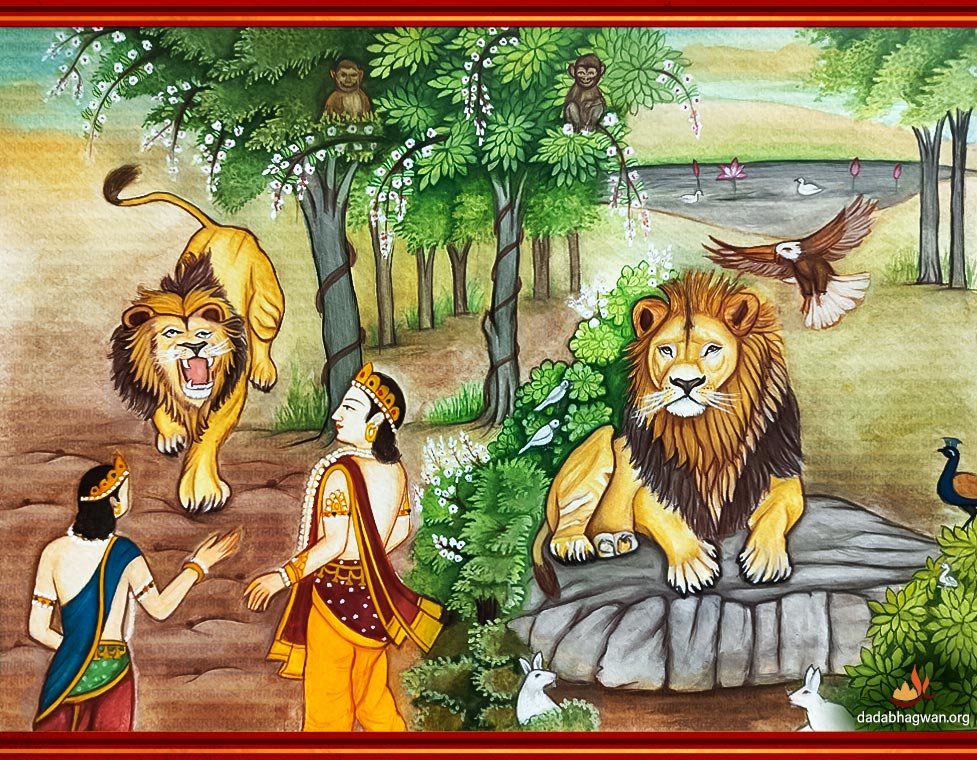
The Lord remained unaffected through all the pain and suffering, and thus, He became free from all His karmas by staying in equanimity. This is why people on the path of salvation seek suffering, as it helps one progress. Param Pujya Dadashri has always said, “Suffering is a vitamin for the Soul and happiness is food for the body.” So, whenever suffering arises, we must consider that as a vitamin beneficial for the progress on the path of liberation. It is like this because the path of liberation is for the brave, not for cowards!
When we fear suffering, it multiplies. We have to finish our karmas, with tears in our eyes or with a smile on our face; no one can escape from it. Then why not face them with a smile? We are in the 5th era of the current time cycle, an era of moral and spiritual decline (Dushamkaal) and therefore, suffering will keep coming. However, we now want to overcome the ordeals that come our way and go to Mahavideh Kshetra from where we can go to Moksha! For that, to know ‘Who am I?’ should be the primary goal of this human life.
As a result of his extremely severe penance, the lion was born into the human life-form again. He did a lot of devotional worship and in his next birth, he became Chakravarti Priyamitra. He ruled the Kingdom very peacefully and did a lot of good deeds. He took diksha and became deeply engrossed in his sadhana. As a result, his next birth took place in the celestial world.
Thereafter, he took birth as King Nandan, which was Lord Mahavir’s 25th birth. In this birth, he performed the penance of vees sthanak and bound Tirthankar naamkarma, as a result of which, he was born as a Tirthankar in his 27th birth.
King Nandan’s next birth took place in the celestial world, and thereafter, he took birth as a Tirthankar. The Tirthankar state is the highest in the world! It is a great state; not only do They attain liberation (Moksha) but They help tens of millions attain liberation as well. When we bow down to such Tirthankars innumerable times, sing Their glory, remember their life-stories and pay obeisance to them, it helps the Energy of the Self manifest within us!
The 27th Birth as Vardhamana Mahavir or Tirthankar Mahavir
The soul of Mahavir Swami Bhagwan was conceived by Devananda, the wife of Brahmin Rishabhdutt. This was one of the 10 wonders in the history, as all the Tirthankars are usually born in a Kshatriya (warrior caste) family. However, as an exception, He was conceived by a Brahmin woman. The reason behind this was that in His previous birth, that of Marichi, He had expressed pride for being a part of the supreme clan. Also, as a Tridandi, He used to conduct himself as a Brahmin, and after that birth, He had taken many births as a Brahmin.
After 82 days of conception, the throne of the Indra Dev shook. He came to know that a Tirthankar was in the womb of a Brahmin, not a Kshatriya. This was not acceptable! So, the Devas shifted the Lord from Devananda’s womb to the womb of Queen Trishala, the wife of King Siddhartha. Queen Trishala then saw 14 auspicious dreams indicating the birth of a Tirthankar. When she got to know that she will give birth to a Tirthankar, she was very happy.
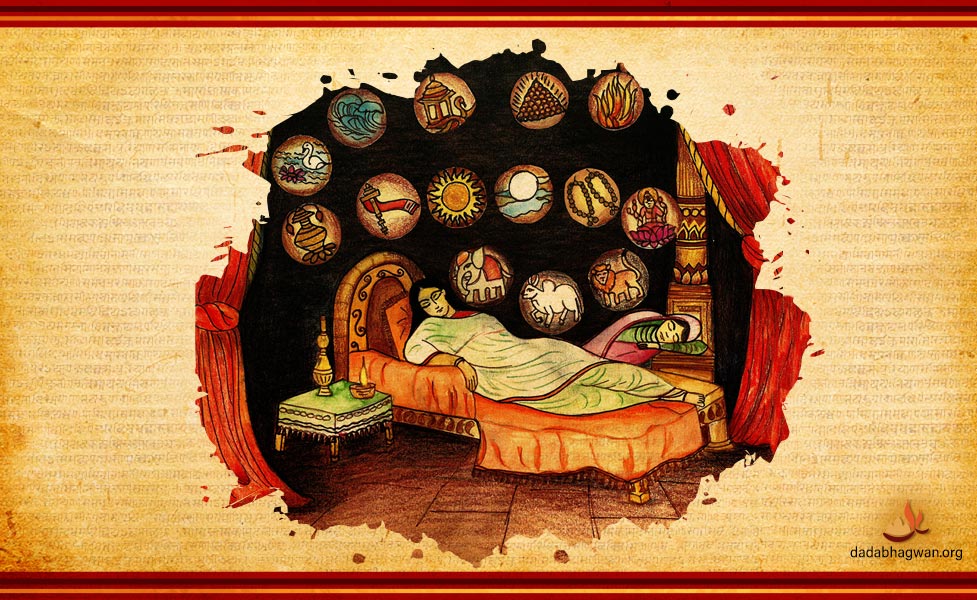
Mahavir Swami had three kinds of knowledge namely, Mati Gnan, Shrut Gnan and Avadhi Gnan, right from when He was in the womb of His mother. As He did not want to give any pain to His mother, He did not make any movement when inside the womb. However, that made the parents worried. With His Avadhi Gyan, the Lord saw that His parents were worried for Him. So, He made a little movement by shaking His toe. Upon sensing this movement, His parents took a sigh of relief. Seeing this attachment of His parents towards Him, Mahavir decided in the womb itself that He will take Diksha only once His parents are no more.
We too can learn from this instance. We should at least ensure that we do not make our parents unhappy. After marriage, our in-laws, too, are our parents. Therefore, we should take good care of our in-laws too, just as we care of our parents.
Param Pujya Dada Bhagwan has always said that He would never forget the favour of even a person who offered Him just a cup of tea; then, how can we forget the innumerable favours done by our parents?! The whole purpose behind reading or listening the life story of great people is that their behavioural traits can instil good conduct in us too.
The celestial beings were in service of Mother Trishala, taking good care of her until the Lord was born. They would always keep her happy. Trishala Mata used to have spiritual talks with celestial Goddesses. Some of the questions she asked along with the replies of the Goddesses are as follows:
- What is the most beautiful thing in the world?
It is the Pure Soul. - What is the characteristic of the Soul?
Pure Consciousness! - Then the Mother asked, what is the form of the Soul?
Soul is full of Knowledge; it is Absolute Knowledge. - What is Dharma?
To come into one’s own nature is called Dharma. For example, a mango is known by its natural properties of its self, such as taste and colour. Accordingly, when one comes into the nature of its real Self or Soul, then it is called Atma Dharma. - What is the highest conduct?
The celestial beings reveal that Vitaragta is the highest conduct. When there is no attachment and abhorrence towards anything, then one is called Vitarag. - Who is the sinner in this world?
The one who causes hurt or harm to others is a sinner! The biggest sin is to condemn one’s faith i.e. to condemn any God, Guru or Religion! - Who is a contented Soul in this world?
The one who dwells in the Soul! - What happens to one who binds neither good nor bad karma?
That being goes to Moksha. - Who is the one having sanity?
The one who is aware of what is of essence and what is not! - Who is the most courageous person in this world?
The one who forgives even his enemy; This forgiveness does not have to be given; it is natural! - Who is the most foolish person in the world?
The one who has attained a human birth, yet does not realize the Self (attain Self-Realization)! - Who is the real courageous person?
The one who annihilates the inner enemies of anger, pride, deceit, greed, attachment and hatred! - Who is called Jin?
The one who wins over attachment! - Who is the best person?
The one who knows all the eternal elements (tattvas)! - Who is called a ‘mumukshu’ (spiritual enthusiast)?
The one who is day and night busy aspiring going to Moksha!
Thus, when Lord Mahavir was in Mata Trishala’s womb, she got such good replies from the celestial goddesses. These serve as greatest life lessons to us!
Param Pujya Dada Bhagwan, too, was asked certain questions, to which He replied as follows:
- What is that thing worth renouncing in this world?
All temporary things! - Who is the one in bondage?
The one who is attached to temporary things! - Who is free in this world?
The one who is detached from temporary things! - Which is the worst hell?
To try and cause hurt to every living being! - Which is the most beautiful thing in this body?
The Pure Soul! - What is the way to go to heaven?
Giving peace and happiness to others all our life! - Who is the poorest in this world?
The one who enters the race-course, i.e., the one who enters competition! - Who is the richest in this world?
The one who is totally contented and satisfied at all times in life! - Which is the biggest disease in this body?
The disease of being reborn in this world (Sansar Rog) and suffering for countless of lives! - What is the best medicine to cure this biggest disease?
Go to Gnani! He uproots this disease from its roots. - How do we know we are now free from this worldly disease?
When we see the world as flawless; when we do not see fault of anyone in this world! - Who is said to be sincere in this world?
The one who is sincere to one’s Self! One who does not cheat anyone is called sincere to one’s Self. - Which is the best service in this world?
The best service is when one is mutely engaged in service of others all his life! - Which is the best merit karma in this world?
Serving your mother, father and Guru!
Birth of Mahavir (Janma Kalyanak)
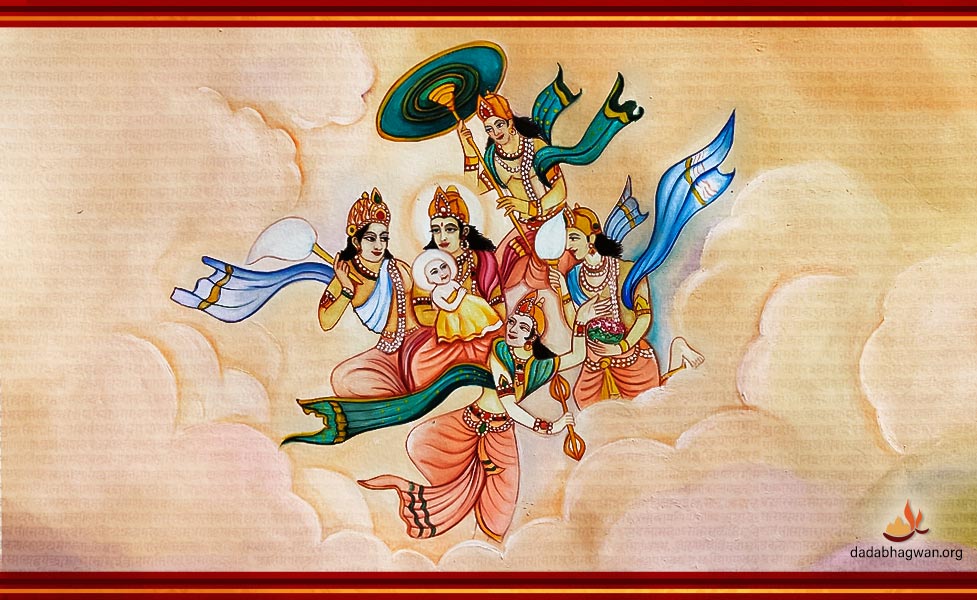
On the 13th day of the rising moon during the Hindu calendar month of Chaitra, Mahavir Swami was born, having a golden complexion. He was so good-looking that anyone would get attracted to Him upon seeing Him. The celestial Gods came down to bathe their Lord with pure water. They took him to the majestic Meru mountains. As all celestial Gods began to pour water onto the Lord, the Dev in whose lap the baby Lord was seated got worried that how would such a small baby be able to bear so much of water falling onto Him. Mahavir Bhagwan recognized this worry. To relieve him of this worry, He pressed the mountain with His small little toe. The Dev immediately remembered that this baby was no ordinary being; He was a Tirthankar! He then sang a hymn in praise of the Lord. All celestial beings present there celebrated this event with great love and happiness. As the event ended, they brought the baby Lord back home and placed Him next to His mother.
The entire atmosphere was full of happiness and celebrations. When Bhagwan Mahavir was 12 days old, His father named Him as Vardhaman. This is because right from the time when the Lord entered the womb of Queen Trishala, grains, pulses, money, and wealth grew in abundance in the kingdom.
Mata Trishala brought up Prince Vardhaman with great love. When the Prince turned 8 years old, His father put Him in school. Gradually, as He became young, His parents decided to get Him married. Vardhaman declined, but when He saw that His parents were not happy with His decision, He gave in and agreed to get married. He got married to Princess Yashoda who gave birth to their daughter named Priyadarshana.
Diksha (Renunciation)
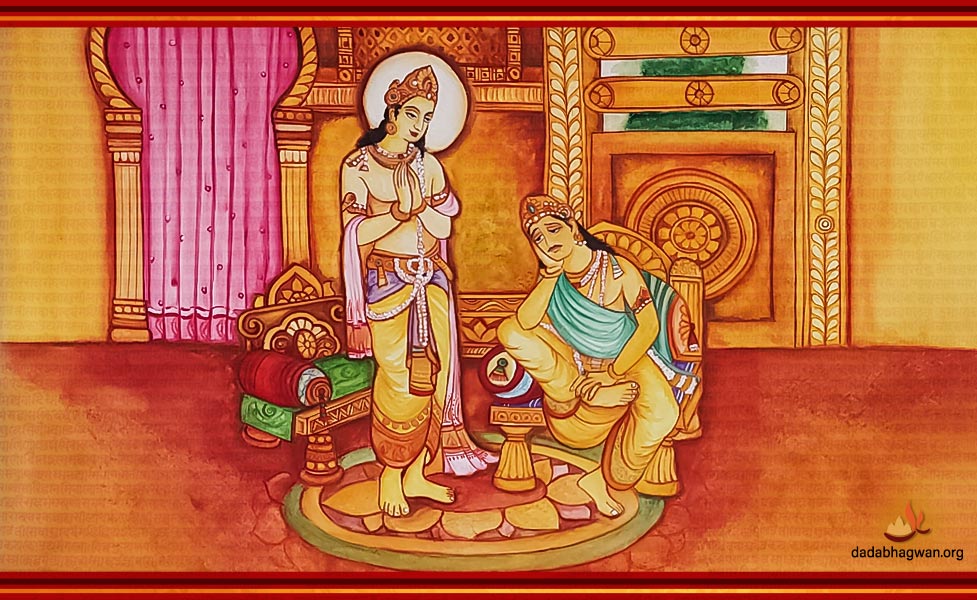
When Vardhaman Mahavir was 28 years old, His parents died. As a result, His elder brother Nandivardhan was broken. He requested His younger brother to take the throne. However, Vardhaman clearly denied the offer and expressed His wish of taking Diksha (renunciation) as their parents were no more. Prince Nandivardhan was not at all prepared for this; He could not afford to lose his brother at this stage when he was already in a state of shock and sadness because of the death of parents. As Lord Mahavir did not want to hurt His shocked brother, He agreed to delay His Diksha by two years. Then, at the age of 30, after donating all His wealth for one year long, He finally abandoned His home and embraced the ascetic life of a monk. Upon taking Diksha, He attained Manahparyav Gnan.
Later, a Brahmin named Devrishi came asking Him for some money, justifying by asserting that he was out of station when the Lord was donating His possessions. However, the Lord no more had any money with Him. Therefore, He gave away half of the only cloth laid on His body. The Brahmin saw that the cloth was a pricey one. So, he followed Him to get the other half too. After covering some distance, the Lord’s remaining cloth got entangled in one of the shrubs. Mahavir Swami knew about what was going on in the Brahmin’s mind. Therefore, He neither tried to remove the cloth nor did He look back. He left the cloth for the Brahmin, who was following Him out of greed, and moved on.
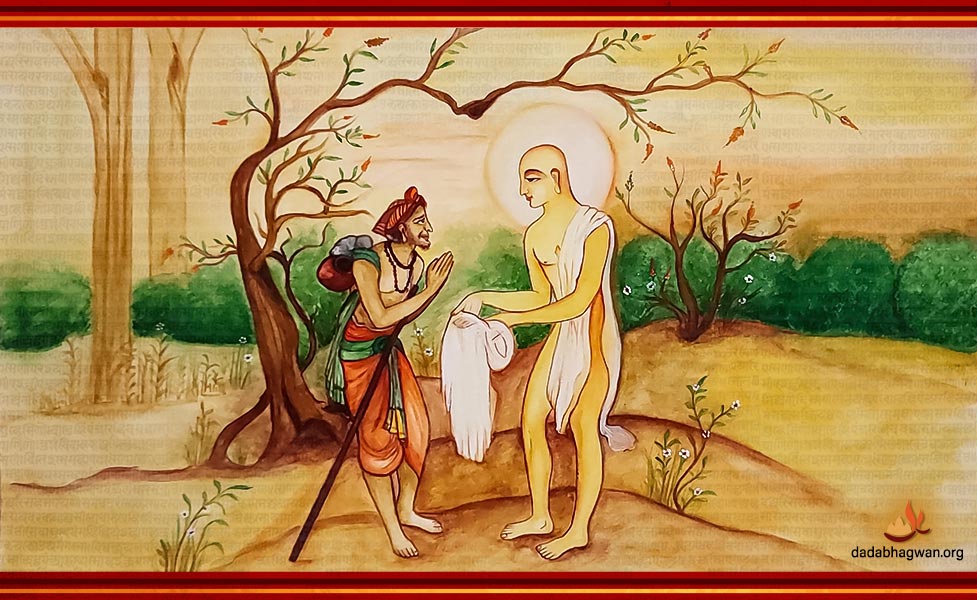
This is how, we too, should leave behind the karmas that have bound us and move ahead on the path of Moksha, or else, they would keep us entangled life after life. This incident from Mahavir Bhagwan’s life inspires us to become like Him who did not wait to collect anything; not even the half cloth of His body. Nothing in the world could bind Him.
As Lord Mahavir moved into the jungles and remained engrossed in the mediation of the Self (Soul) as much as possible; the ignorant people, not recognizing the Lord and His greatness, performed several atrocities on Him. Upon seeing this, the Indra Dev came down to the Earth and offered suitable help to the Lord. However, the Lord denied, saying that every Tirthankar fights His karmas and goes to Moksha; He is not afraid of facing them.
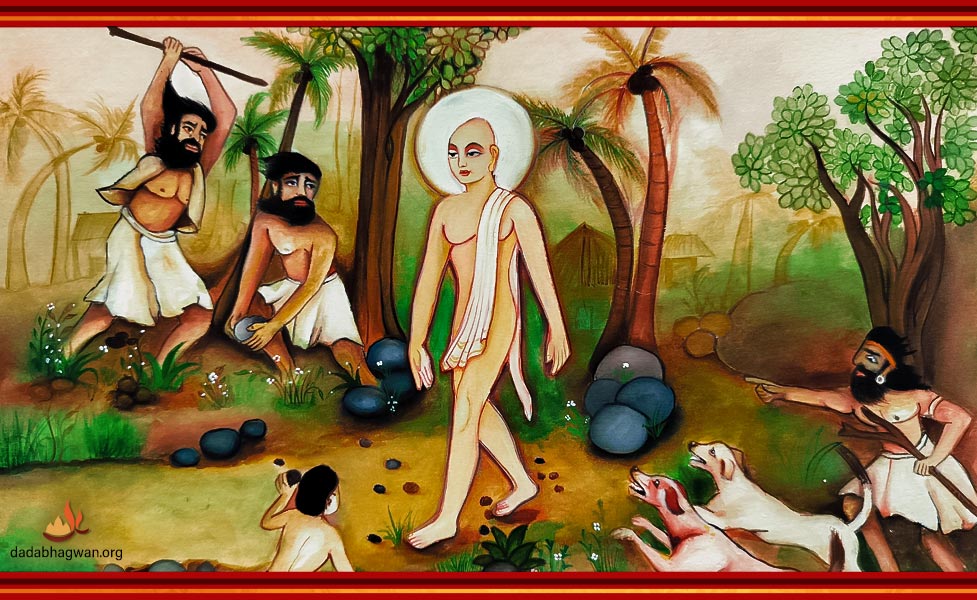
As the Lord moved from one place to another, He observed certain principles, which were as follows:
- Do not stay in a place where people do not like you.
- Do Kayotsarg, i.e., use your body to do penance for the purpose of salvation.
- Eat only that much food that can be held in your two hands.
- Practice silence. Speak only when essential.
- Practice sanity and normality (vivek) in rendering respect to people.
Chandkaushik Snake
Here’s a story from Bhagwan Mahavir life history indicating how the Lord blessed a ferocious snake called Chandkaushik. In his previous birth, Chandkaushik was a sage who did heavy penance. Owing to this penance, he had developed a lot of ego and was filled with anger. One day, while returning from a jungle after doing penance, he stepped on a frog and it died. The disciple who was with him advised him to repent for this mistake so that he becomes free from the sin of killing a frog. The monk did not hear to what he said.
As a rule, when the day ends, one is supposed to repent for all the faults happened throughout the day and seek forgiveness from God so that the sins do not accumulate and one feels light. This is a good practice that we should follow. For at least 10 minutes every day, before going to sleep, we should recollect all the incidents during the day in which we may have hurt any living being because of our anger, pride, deceit or greed. Then for each incident, do pratikraman by remembering the Pure Soul (God) residing in that living being, repenting heartily and making a firm resolution by praying, “This was wrong on my part. I will not do this mistake again.” This will help us progress on the path of liberation and will also increase peace in our life.
Therefore, during evening, the fellow disciple once again reminded the sage to repent for killing the frog. This made the sage furious and he ran after him to hit him with a stick. However, he collided with a pillar and died there in the state of anger. In his next birth, owing to his hard penances, he went to Heaven. Thereafter, he became a monk and lived in a huge farm that he owned. He had deep attachment towards this beautiful farm wherein he grew a lot of fruits and flowers. Anyone stepping into this farm and breaking even a twig would make him go wild. Once, while he was in penance, a lot of young boys came to play in the farm and they were enjoying themselves by plucking flowers, throwing stones and dropping fruits. The moment the monk got the news, he ran after the boys with an axe in his hands to catch and punish them. However, on the way, he fell and his own axe pierced into his head. He died in great agony and as a result, he became a ferocious snake who would kill anyone on the spot just with its poisonous glance!
One day, while doing vihaar (moving on foot from one place to another), Mahavir Swami had to pass through this dense jungle where the Chandkaushik snake lived. On the way, the villagers blocked the Lord’s way and pleaded Him to not go ahead, as the snake did not spare any being that came in his way. However, the Lord continued walking on that path for He knew that the time had come for Him to bless this snake.
As the Lord arrived in the jungle and came closer to the snake, the snake was full of anger. He hissed loudly and repeatedly to threaten and scare the Lord. However, to his surprise, Lord Mahavir stood before him; strong and fearless! Chandkaushik could not bear this. He finally bit the Lord’s toe from where white blood started coming out instead of red. While the poison would otherwise kill the prey on the spot, the snake was shocked to see Mahavir standing calm and composed, not perturbed at all by any of his actions. The calmness of Tirthankars is always unparallel. Even the ferocious beings become still and calm the moment they come in front of them. The colour of Tirthankar’s blood is always white. Chandkaushik wondered who was this great person.
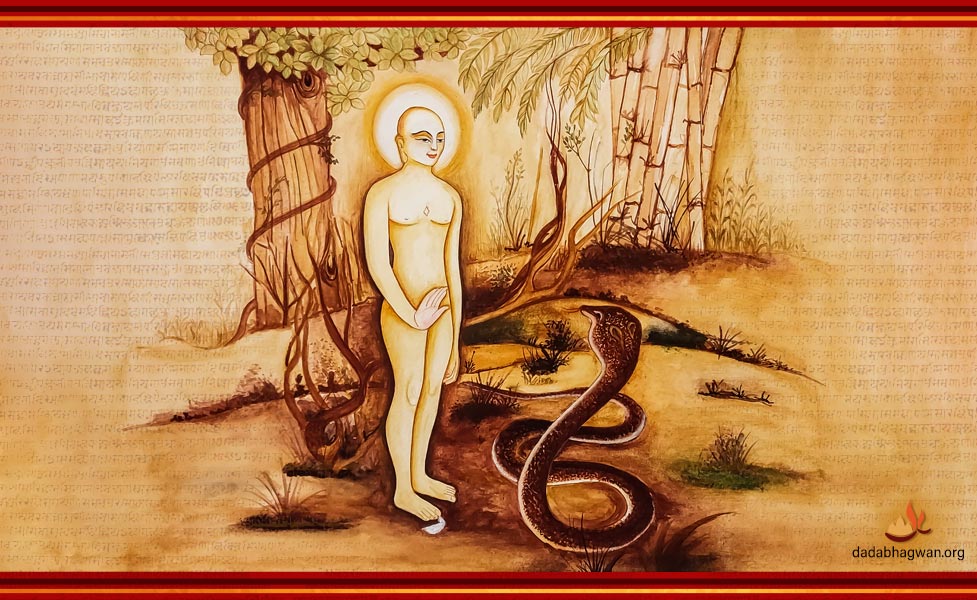
With great compassion and love in His eyes, the Lord said to him, “Wake up, wake up Chandkaushik!! Realize what you are doing!” Listening these words, the Chandkaushik snake immediately remembered his two previous lives and realized what his anger and ego had done to him in his past lives. He instantly calmed down and bowed down into the God’s feet with the feelings of surrender and repentance in his heart. He made a firm decision in his mind, “I do not want to cause slightest hurt to any living being” and got totally absorbed in doing pratikraman of all the mistakes he committed so far in this life.
This incident helps kindle awareness in our hearts that the true purpose of our life is to persevere to attain Moksha, not for wasting it by causing fear and terror in the hearts of people around us through our words and actions filled with anger and fury.
As the Lord left from there, the transformed Chandkaushik snake lied on the ground in deep meditation. Some came and threw stones at him, while few hit the bleeding snake with sticks, as they remembered how the snake had killed their loved ones. Many, on the other hand, came to worship him and offered him milk to drink and food to eat. Blood, milk, ghee and food attracted a lot of ants that came and bit his body. However, the snake did not react to anyone or anything at all. He patiently and peacefully destroyed all his bad karmas (that could have taken him to hell otherwise) by maintaining equanimity, and on death, went to heaven. This story enlightens us about the fact that no matter how ferocious our anger may be, it is possible to get out of it through repeated heat-felt pratikraman.
Goshala
Lord Mahavir continued with His vihaar. One day, a person named Goshala, who had a family tradition of going door to door begging for alms and food, happened to see Mahavir Swami. He observed Him from a distance for a few days and felt that staying with Him would stand to his advantage in terms of procuring food and alms. So, he became a self-acclaimed disciple of the Lord and followed Him like a shadow for his vested interests.
His character was exactly the opposite of that of the Bhagwan. He would fight with people over every little excuse and would create some or the other problem for those around. Assuming Lord Mahavir to be his Guru, people would come complaining to Him, and some would even punish the Lord for Goshala’s mistakes. However, the Lord always remained silent and unperturbed as He was aware that it was his past karma bearing fruit; people rendering punishments to Him were mere instruments.
This is something we, as followers of the Lord, ought to learn - the awareness of “It is due to my karma only that the person is behaving with me in this manner.” Seeing the faults of others is one of the biggest faults that we commit day in and day out. Therefore, daily 10 minutes, before going to sleep, we should find out whose faults we saw throughout the day, and then, specially do pratikraman for each such mistake by praying to God, “Oh God, I have made this mistake of seeing faults of the other person. Please forgive me! And grant me strength to not see others’ mistakes.” This is one of the simplest keys to attain Moksha.
Once Goshala did such a job that the King’s army took both the Guru and the disciple into custody. However, the ruler of that kingdom had worked under King Siddhartha, the father of Mahavir Swami, and hence, he immediately recognized Lord Mahavir. He set both free, and later, on every occasion, took good care of the Lord.
To exhaust His karma, the Lord then decided to go to ‘Anarya Desh,’ meaning a province where one would face adverse circumstances. He took this decision because He knew that adverse circumstances accelerate spiritual awareness. People there were underdeveloped, and hence, would not understand the stage of God.
The Lord did not even get food there; instead, He received a lot of insults and beating from people. Param Pujya Dada Bhagwan has always said, “Convenience is considered as ‘food’ and inconvenience is considered ‘vitamin’ by the Gnanis. Generally, people do not like when someone scolds them. Hey, why not make that a vitamin? Your work will be done!”
Anekant Vaad
One day, while on vihaar, Mahavir Swami and Goshala were passing through a farm. A small plant of til (sesame) was standing all alone in one place. Seeing this plant, Goshala asked Bhagwan a question, “Would this plant yield til? If yes, how many til seeds would it yield?”
The Lord, who usually maintained silence, replied, “Seven seeds of til would grow.” Goshala, walking behind Lord Mahavir, was anxious to prove the Lord’s statement to be false. Therefore, he uprooted the plant. When they returned to that place after a few days, he showed the barren land to the Lord and said, “See Lord, the plant is not seen. Does this mean that your statement is proven to be false?” The Lord smiled and said, “The plant that you had uprooted is lying there, in that corner of the land. After we left from here, the wind swayed it there. Then, it rained. This dampened the soil. Just then, a cow happened to walk that path and the little plant’s roots got buried into the damp land. The plant began to grow, and right now, there are seven til seeds in it.”
Seeing this, Goshala made up his mind on the philosophy, “Whatever is to happen will happen; no one can stop it from happening. What is not going to happen will not happen; no one can make it happen!” This is called ‘niyati vaad.’
However, Tirthankar Mahavir preached ‘Anekant vaad,’ meaning nothing should be derived by seeing from one angle (viewpoint) only. Anything should be seen from multiple angles; only then the truth can be perceived. Therefore, in this case too, it is not right to see things from one viewpoint or only being ‘niyati vaad’. This would be misguiding, as there are five federal causes which when together can make anything happen. Niyati is just one of them.
Five Samvay Kaaran
There are five federal causes that make an event happen. They are:
- Swabhav,
- Purusharth,
- Niyati,
- Kaal, and
- Prarabdh.
Let’s understand this through an example.
Let’s take an example of a mango tree. Everything has a nature of its own. The nature of a mango tree, mainly of its seed, is to give mangoes. The fruit of mango would certainly not grow on any other tree. Similarly, the tree will not give any other fruit, except for the mangoes.
Next, there is effort involved. We sow a seed of mango, water it and nurture it. This effort is required, without which the fruit of mango would not grow.
Then, there is niyati. After nurturing the plant, if a strong wind blows and destroys the mango seed, no mangoes would grow. This is called niyati, the flow of things which is in the control of nature.
Also, time is equally important. No matter how much effort we put in, we cannot get this sweet fruit in winter. Only when it is the month of Vaishakh (April), the mango ripens. Similarly, if we wish to get the fruit overnight, as soon as the seed is sown, it will not happen. A certain period or duration is required for the mangoes to grow. This is the time factor.
Finally, nice ripe mangoes may have come on the tree, but they are so high up that you are unable to reach them. Although the four causes have been satisfied, you cannot have the mango. Just then a small lad comes with a long stick in his hand, pulls the fruits down, and you pick and eat them. This is the prarabdh; now came the end! This end or prarabdh is always correct.
Thus, for any event that happens in our life, there are the five federal causes working behind it. The Lord gave this subtlest elemental knowledge to the world! If we have the exact understanding of it, then no matter what occurs in our life, we will not be overwhelmed with pain or laughter. However, if we hold onto only one viewpoint or federal cause, like Goshala did, it would misguide us.
- Param Pujya Dada Bhagwan has put these five causes into ‘scientific circumstantial evidences’;
- The result or effect of the scientific circumstantial evidences is what Param Pujya Dada Bhagwan calls as ‘vyavasthit’.
So, we do not have to sit idle based on niyati vaad. We must do our duty (effort); it is one of the evidences. Thereafter, whatever the result may be; it is not in our hands; it is vyavasthit. For example, if a glass is about to fall, we must try our best to save it. However, if it somehow breaks, this result, which is of ‘the glass breaking,’ is called vyavasthit. We must readily accept it without any pain or laughter.
Thus, Param Pujya Dada Bhagwan has said, “This world is nothing but the result of the scientific circumstantial evidence. Whatever one can see through the five senses is a result; it is all vyavasthit.”
This knowledge of vyavasthit not only helps us live a peaceful worldly life, but it also helps us attain Moksha, i.e., the ultimate liberation. This is because with this knowledge, new karma cannot be bound. Just what is required is to once get our Soul awakened by the Enlightened One, i.e., the Gnani! Thereafter, as one understands the knowledge of vyavasthit, one does not become a doer of anything.
Anything that is happening in this world is based on scientific circumstantial evidences; hence, no one in this world is an independent doer. Each one of us is only a Pure Soul, who knows and sees all the circumstances. To know and see is the real effort; rest all is an illusory effort that binds karma in this world.
Therefore, on taking Diksha, Mahavir Swami Bhagwan said,
“Aigo me saaso appa, Naan dansan sanjuo; Shesha me baahira bhaava, Savve sanjog lakkhana, Sanjog mula jeevena, patta dukha parampara; Tamma sanjog sambandham, savvam tivihen vosiraami.”
meaning...
I am a permanent Soul; I am one with Gnan (know) and Darshan (see) that alone constitute my Self; rest all things are external to me. What is the nature of these external things? They are all in the nature of circumstances. Circumstance is at the root of worldly life, and thereafter, there’s a series of misery. Therefore, I surrender all the circumstances through my mind, speech and body.
Thus, in this world, there is nothing but ‘Pure Soul’ and ‘circumstances’. These circumstances are such that they constantly keep changing. Circumstances arise and pass away. My nature is only to see and know these circumstances. One who understands this knowledge fully gets free from all kinds of worries, stress and tensions.
Sangam Dev
Lord Mahavir’s power and strength to fight against the karmas were extraordinary. Therefore, the celestial Gods gave him the name, ‘Mahavir.’ Let’s read the story about it.
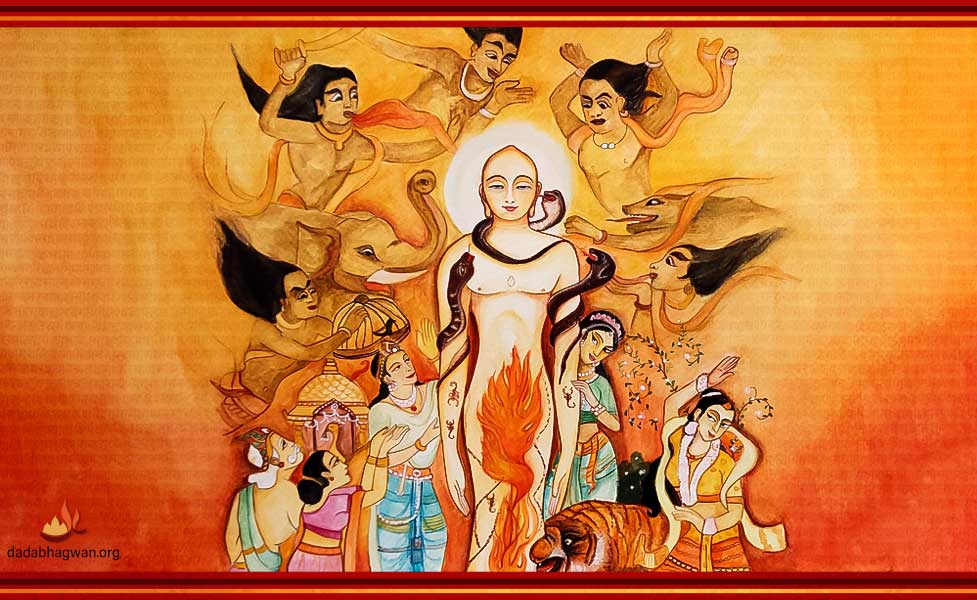
One day, Mahavir Swami was meditating in a garden. Observing a high degree of engrossment in meditation of the Bhagwan, Indra Dev exclaimed, "You are great Prabhu Vardhaman! Today, no one in the three worlds can distract you. There is no one as brave, as serene, and as equanimous meditator as you. You are Mahavir!" The other celestial Gods present in the Indra Dev’s assembly also admired the Lord’s valour. They readily agreed to the title of ‘Mahavir’ (meaning most courageous) given to Him by Indra Dev, finding it to be apt.
While everyone was busy adoring Him, one celestial God named Sangam got envious listening to the praise of the Lord. He challenged the title of given to the Lord and proclaimed, "If Devraj does not interfere, I will break the meditation of Mahavir in no time and prove you wrong." Indra Dev unwillingly remained silent.
Assuming it to be Indra Dev’s consent, Sangam Dev inflicted 20 fatal tortures (upsarg) upon Tirthankar Mahavir to break His meditation.
- He began with the execution of his first plan to break the meditation, wherein he blew so much of sand on the Lord such that the Lord got completely submerged in its heap. He could not even breathe. However, His meditation continued with the same vigour!
- Thereafter, he brought swarm of ants that pricked the Lord’s body all over, but to no avail.
- After this, countless big mosquitoes stung the Lord so badly that His body was bleeding profusely all over. However, Lord Mahavir faced every attack with complete equanimity and remained perfectly established in His meditation.
- Then came an army of big white ants who turned the Lord’s body into a termite-hill.
- Next, black scorpions were sent, which crawled all over His body and simultaneously pierced it with their poisonous stings. Yet, the Lord was as steady as ever!
- In his sixth attempt, Sangam Dev threw mongooses with very large teeth which bit the Lord and tore apart His flesh. He still remained unperturbed.
- Thereafter, large cobras slapped their long tails onto the Lord’s body to give Him great pain. When they saw that this is having no effect on His unshakable determination, they bit Him severely all over the body.
- Then, Sangam Dev threw big giant-field rats which bit the Lord’s body with their big teeth and inflicted great burning on the skin.
- After all of this, there appeared a white elephant that goaded Lord Mahavir, piercing its large pointed tusks into His chest. However, the Lord continued to remain in deep meditation. The elephant then lifted the Lord, tossed Him in air, and then banged Him down. When the Lord fell on the ground, the elephant crushed Him with its legs. He repeated this several times, tossing the body of Bhagwan up and down, up and down. Mahavir, being a Tirthankar, had charam sharir (last body, on death of which, one attains Nirvana). Hence, until all His karmas get over, He does not die! However, the Lord’s equipoise amidst even the worst tortures remained intact. Sangam Dev could not shake His equanimity at all.
- This was followed by an attack from an ominous looking ghost.
- As if this was not enough, big tigers attacked and gored the Lord with their sharp nails and claws. However, nothing affected Mahavir Swami even now!
- Sangam Dev continued to harass the Lord in many other ways. He spoiled the entire food the Lord had brought, and thus, didn’t allow Him to eat.
- He made Him walk in deep sand for long distances. He attached the Lord with 500 beings at once who clasped Him and broke His bones.
- Now, the desperate Sangam Dev changed his tactics. He created an illusion as if King Siddharth and Mata Trishala (parents of the Lord) were weeping and wailing in great pain. However, this did not disturb Him either. He was well-aware that His parents were no more and this was a mere illusion!
- Sangam Dev then lit fire between the Lord’s two feet and started cooking rice. Big flames surrounded and burnt His body massively. However, even this could not disturb the meditation of Mahavir.
- After this, Sangam Dev came in the disguise of a bird-catcher and hung a lot of cages on the shoulders, neck, ears, nose and hands of the Lord. The birds pecked the body of the Lord through the gaps in the cages, ate out His flesh and blood oozed from these new wounds.
- Sangam Dev then blew storms, torrential rains and hail-storms. However, the Lord stood still as ever.
- Thereafter, he tried swirling giant iron chakras at Him one after another, but even they were unable to disturb the rock-hard resolve of Mahavir Swami.
- The frustrated Sangam Dev even lifted a large mace and threw it at the Lord. It was such a heavy blow that it buried the Lord into the ground right up to His knees. Yet it could not distract the Lord’s attention even a bit. Sangam Dev realized that this approach was not working. So, he came into his celestial form and tried to lure Him by saying, "Oh! I am highly pleased with you. I can take you to heaven with this mortal body of yours. If you so desire, I can even take you to Moksha." He tried to fool the Lord. However, Mahavir Bhagwan, who was the Lord of Lords - a Tirthankar, knew, “No one could take anyone to Moksha. It was only through my efforts that I can earn Moksha; no one else can do anything in it!” This is a great learning for the ones who believe that someone will get my job done without me doing anything for it. This story teaches us to leave greed and live with self-esteem (khumari) based on the fact, “No one can give me anything; whatever will come to me is only a result of my own karma; no one can do anything for anyone; we can go to Moksha only when we put in the right effort.”
- Finally, Sangam Dev created an environment conducive to lust and produced sparsely clad fairies who undulated their voluptuous bodies before the Lord invitingly. However, He remained unmoved.
In this manner, Sangam Dev, for six long months, with his cruel and brutal attacks, painful afflictions and treacherous tactics, tried his best to break the Lord’s meditation. However, he failed in his every attempt. Never in history has such tortures been inflicted upon any other Tirthankar or any person. However, the Lord surpassed them with perfect equanimity!!! Throughout the tortures meted out to His body, He was busy enjoying the eternal bliss of the Self (the Soul) within. Hence, He did not have an iota of ill-feeling towards Sangam Dev. Throughout this entire process, the Lord’s only interest had been that of finishing His karmic account with equanimity so that He could proceed towards Keval-Gnan steadily.
Sangam Dev now was greatly ashamed of his actions. He realized his mistake. So, he surrendered before the Lord, and with great repentance in his heart, sought forgiveness from God. Out of sheer compassion towards Sangam Dev, tears rolled down the Lord’s cheeks for the sins he had made!
The Understanding of Bhaav V/s Dravya
Once Mahavir Swami was on a four-month fast and was doing vihaar. There was a businessman named Jindutt Sheth who had enormous devotion for the Lord. He strongly wished to see the Lord at his home and break His fast by serving him food. However, the Lord arrived at the house of Navin Sheth who did not have any special feelings for the Lord like Jindutt Sheth did. He ordered his maid to give some food to this Sadhu. With this, Lord Mahavir broke His fast. The celestial Gods showered flowers, pearls, diamonds and emeralds on the Navin Sheth’s house. This was because it was from this house that the Lord had got the food for breaking His fast.
Just then a few Kevali Sadhus, who were disciples of Shri Parshwanath Bhagwan, the twenty-third Tirthankara , arrived there. There is a gap of only 250 years between Parshwanath Bhagwan & Mahavir Bhagwan; hence the disciples of Lord Parshwanth too existed during Lord Mahavir’s time. People narrated this incident to them and asked the Sadhus a question: Who bound better karma, Jindutt Sheth or Navin Sheth? While the former had the best intention (bhaav) of availing the opportunity to help break the Lord’s fast, the latter gave the food but without any intention to do so. They could see how Navin Sheth was blessed for his good deed. However, at the same time, they were curious to know whether the pure intention of Jindutt Sheth held some meaning in the eyes of Nature.
The Sadhus enlightened people on the subject by explaining them that the law of karma operates on the basis of one’s intentions. Navin Sheth did a good deed, be it unknowingly and it was greatly commendable. This entitled him to be rewarded with the shower of blessings in the form of precious stones and beautiful flowers on his house. However, as Jindutt Sheth had upheld the best intention, He had become qualified to go to the highest celestial abode i.e. the Achyuta Devloka in his next birth. So, the intentions are of paramount importance. It is the intentions that bind karma, and thereafter, one’s actions follow naturally as a result of these intentions.
Moreover, if the intentions are for God, one binds the best karma if they are good and the worst karma if they are maligned. Good intentions help us evolve to a higher level of development and that they later materialize into good deeds for which we are separately rewarded. If ever in life we observe our intentions getting maligned or end up performing bad deeds of any kind, Lord Tirthankar teaches us to instantly invoke the feeling of repentance for the same. Depending on our intensity of repentance, our bad intent reverses to that extent. This is called ‘bhaav pratikraman’. In today’s Kaliyug, it doesn’t take much time for one’s intention or bhaav to become bad. Therefore, we must make it a practice to inculcate the habit of doing ‘bhaav pratikraman’ everyday; so that we too, as the followers of Lord Mahavir, can proceed on the path of Moksha.
In bhaav pratikraman, we remember the Pure Soul of the person towards whom we have spoiled our intention out of anger, false, pride, deceit, greed, jealousy or any other negativity within us, and heartily ask for forgiveness, “Oh God, this mistake has happened by me. I ask your forgiveness with all my heart. Please forgive me. I decide never to do this mistake again.” This is how we can do alochana, pratikraman and pratyakhyan internally only, through our bhaav.
Chandanbala
Once Mahavir Swami took up the strictest abhigraha. Abhigraha means pre-deciding certain conditions in mind, followed by a firm determination that, ‘Only if all of these conditions are met, will I accept food; not otherwise.’
This time Bhagwan had decided on the following hard-to-find conditions:
- The person offering food should be a princess Sati, who has have had to become a maid.
- She should be a prisoner, tied up with the iron chain in her feet.
- She should be bald (having no hair on her head).
- She should be hungry and should have tears in her eyes.
- She should have lentils (adad na baakuda) in her hands.
- While offering the lentils, her one foot should be inside the house and other outside the house.
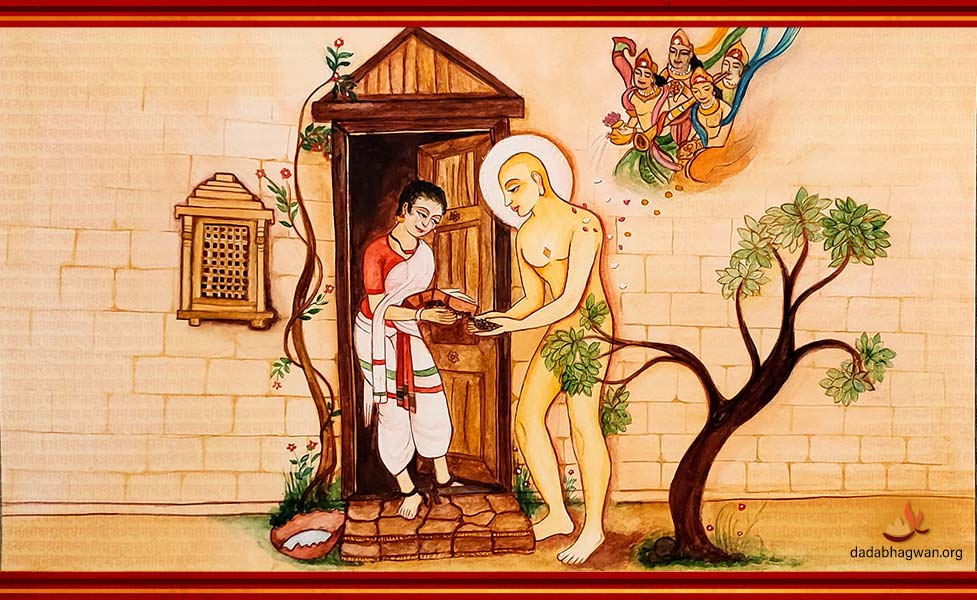
Four months passed and Bhagwan continued to be on fast. Therefore, the King then announced that everyone in his kingdom should prepare the best of combinations of food in their homes so that the Lord finds His suitable option. Well, it was Chandanbala who fulfilled all the hard-to-find conditions of the Lord to break His fast. So, let’s first know about her.
Earlier, in the city of Champa, there stayed a little princess named Vasumati. She was the daughter of King Dadhivahan and Queen Dharinee. One day, the King from the neighbouring province got into a war with her father. King Dadhivahan lost the battle, and in chaos, the family also got separated. A camel man got hold of Vasumati. He took her to Kaushambi to sell her and make some money. A merchant named Dhanavar Sheth saw Vasumati and thought in his mind, “This little girl seems to be belonging to a good family. Maybe she has got separated from her parents. If this is true and she is sold as a slave, what would be her fate like?” So, out of sheer compassion, He purchased her and brought her home. On the way home, He inquired who is she but Vasumati did not disclose her identity.
When they got home, the merchant narrated the entire incident of Vasumati to his wife, Moola, and requested her to treat her like their daughter. They named her Chandana. Chandana stayed like a daughter in their house. Seeing this, Dhanavar Sheth was quite pleased. However, his wife Moola was suspicious that her husband may marry Chandana because of her good beauty.
One day, the merchant returned home from his work. His servant who usually washed his feet was absent. So, Chandana came forward and began washing his feet. Just then, her long hair slipped out of the buckle. To avoid her hair from getting dirty, Dhanavar Sheth lifted them and clipped them back. Moola saw this and was now convinced that her suspicion was indeed correct. So, after a few days, when her husband was out of station, she called for a barber to cut all hair of Chandana. Moola made her bald, tied her legs with heavy chains, locked her into the basement and left for her parents’ home.
After three days, when the merchant returned home, He could not find Moola or Chandana anywhere. Anxiously, He searched for them in different rooms. Just then, an old lady in their neighbourhood came and narrated what all Moola did to Chandana in his absence.
The merchant instantly ran down to the basement. He was shocked to see Chandana in this condition. His heart was overwhelmed with compassion. He rushed to the kitchen but all that He could find was some dry lentils (adad na baakuda). He gave them to Chandana and said, "My daughter, you have not eaten for the past three days. Please eat this. Meanwhile, let me get a blacksmith to cut off these heavy chains.”
Chandana wished to offer this food to some Saint before she could eat. Just then she saw Lord Mahavir coming towards her home. Very happily, she rushed to the door. Her feet being chained, one foot was outside and the other was inside. However, within a moment, Mahavir Swami turned back, as His one condition of ‘tears in her eyes’ was still missing. It puzzled Chandana to see the Lord going back! With much regret for being unable to serve the food to the Lord, lots of tears rolled down her eyes. Meanwhile, the Lord slightly looked back and saw the tears. Upon this, the Lord came back, accepted the lentils, and broke His five months and twenty-five days old fast.
On the other hand, the celestial beings broke the iron chains of Chandana and adorned her with gold anklets, jewelry, long hair, and clothes.Chandana was amazed to see all these changes. She whole-heartedly surrendered herself into the feet of the Lord.
As the King got the news, he rushed to this place with his family and his ministers. One of the ministers recognized Chandana and he introduced her to the King, "She is Vasumati, the princess of Champa and the daughter of King Dadhivahan and Queen Dharinee." King Shaitanik and Queen Mrugavati took her to their palace and kept her with them, until she was able to take Diksha from Bhagwan.
The Cow Herder Pierced Thorns into the Lord’s Ears
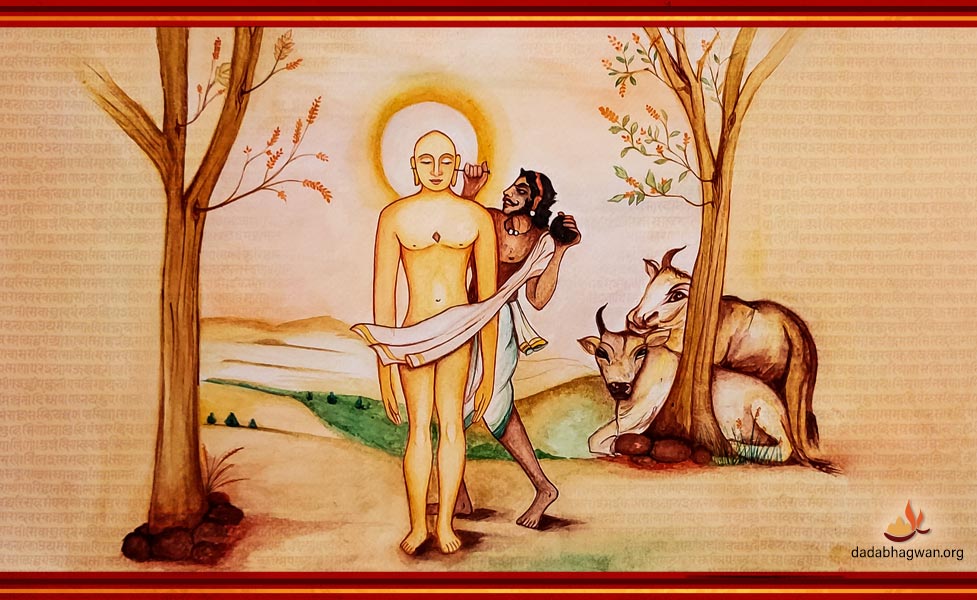
One day, Lord Mahavir was in kayotsarg. Kayotsarg means meditating in the awareness of the Self, maintaining separation with the mind and body and observing all that arises and passes away in the body. Just then, a cow herder happened to pass by. Seeing the Lord, he requested Him to take care of his cows for some time so that he could finish some work of his. As the Lord was deeply engrossed in His meditation, He did not hear what the cow herder said. Not realizing this, the cow herder left the cows near the Lord and went for his work. On his return, he found that his cows were missing. This made him furious. He yelled at the Lord, "Where are my cows?”, but to no avail. Vardhamana Mahavir was still in meditation, and hence, did not reply.
The cow herder searched for his cows here and there, but they were not found anywhere around. So to teach him a lesson, the fuming cow herder pierced wild thorns into the Lord’s ears in such a way that the thorns from both the sides met inside, and on the outside he cut the thorns such that they were not to be seen at all so that no one would know about it.
However, Bhagwan Mahavir didn’t get disturbed at all and He continued to remain in the meditation of the Self (the Soul). Bhagwan Mahavir Swami was aware that this is a result of His bad karma, that of pouring hot lead into the guard’s ears, which was bound in the birth of Vasudev Tripushtha. Owing to this awareness, no bad feeling or anger arose in Him towards the cow herder who gave Him such intolerable pain.
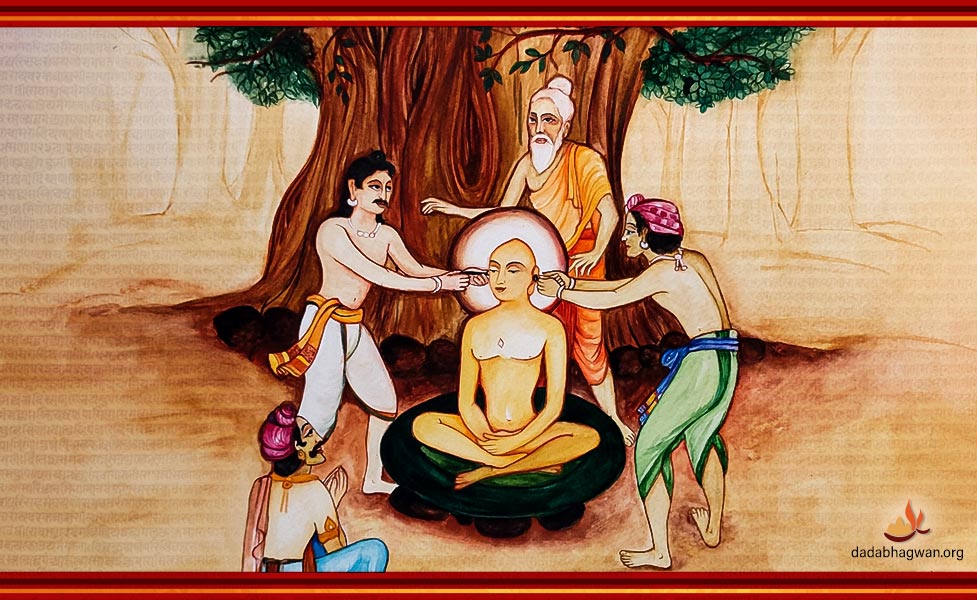
For six months, the thorns remained pierced in His ears. One day, He arrived in a village where a Vaid (Ayurvedic Doctor) happened to see the Lord. Looking at the Lord’s face, the Vaid realized that there was something, which was causing pain in Bhagwan Mahavir’s body. Being a Vaid, he examined Him and saw the thorns in His ears. He carefully pulled them out from the Lord’s ears. However, when he did so, the Lord gave out a loud shrill and tears rolled down His eyes. This suggests how intense the pain was; yet the Lord was in complete equanimity. He had a clear awareness that the pain is to the body and not to me, i.e., the Soul. The Vaid treated Him with herbs, and in some time, the Lord recovered.
Keval Gnan (Omniscience)
Lord Mahavir then reached a village. He was 43. After 12 years of rigorous penance during His Diksha period, while He was meditating in a cow-milking posture under a Saal tree on the banks of the river Rujuvalika, the most auspicious moment finally arrived. He attained Keval-Gnan (Omniscience, Absolute Knowledge), as his four main karma (the ghaati-karma) namely Gnanavarniya karma, Darshanavarniya karma, Mohniya karma and Antraay karma got shed off completely.
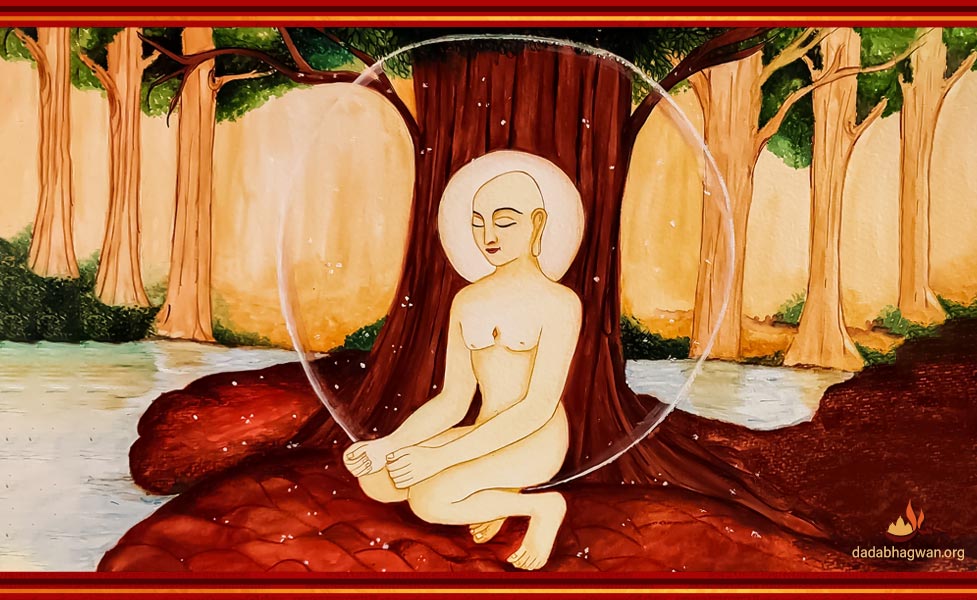
During this moment, every living being in the Universe experienced total peace within. On this occasion (Keval-Gnan Kalyanak), the celestial beings were overwhelmed with joy. They made great celebrations. People on the Earth, who were desperately waiting to come to His refuge, also celebrated this moment with great devotion, as they would now be able to renounce the world and ceaselessly listen to His Deshna (speech of Tirthankar).
Gautam Swami and the Other 10 Gandhars
In a town called Gobargaon located in the state of Magadh, there lived three Brahmin brothers Indrabhuti, Agnibhuti and Vayubhuti who were great scholars. One day, a team of 11 Brahmins and thousands of their disciples got together to perform a grand yagna. Suddenly, they saw a lot of celestial beings in the sky coming towards the Earth. They were greatly pleased at this sight, as they assumed that they were coming to grace their yagna. However, in no time, the celestial beings surpassed their site and moved ahead to some other place.
They soon came to know that the celestial crowd was heading towards the Samosaran of Tirthankar Mahavir. Everyone in the ceremony was overwhelmed by listening the name of ‘Mahavir’. Indrabhuti wondered, “Who is this Mahavir?” His ego of being a great scholar was challenged! Hence, Indrabhuti rushed to meet the Lord with an aim to prove to the world His superiority over Him.
Upon reaching the Samosaran, the Lord welcomed Indrabhuti calling by his name. Indrabhuti was extremely surprised. He immediately felt, “Who does not know me? No wonder He knows my name.” The very next moment Bhagwan said, “Indrabhuti, Jeev is there and you should not question it. The Soul can be experienced through its qualities of Gnan (Knowledge) and Darshan (Vision). It is the real Self. Once the Self is realized, it puts an end to all miseries.” This time, Indrabhuti was shocked because the doubt regarding the existence of the Soul had been constantly bothering.“ He knows what I am thinking too.” His heart was overflowing with great reverence for the Lord as Bhagwan continued to help Indrabhuti in changing wrong beliefs. Finally, the Brahmin surrendered into the lotus feet of the Lord and became His first Gandhar (chief disciple)!!! Then onwards, Indrabhuti was known as Gautam Swami.
Thereafter, his brother, Agnibhuti, came to the Samosaran looking out for Indrabhuti. Bhagwan Mahavir welcomed him as well, “Welcome Agnibhuti! You have a doubt whether karma exists. Karma does exist. It is because of karma that we have unhappiness and suffering in life. Even when we have done nothing, we experience unhappiness; and even when we do nothing, we get lots of happiness. Why does one get happiness and the other is deprived of it? It is because of the one’s past karma. Due to karma, our birth happens. Karma bound in the previous life is the cause and the result of that karma is the effect. We are able to see the effect, but we are not able to see the cause.” Listening to this, Agnibhuti was greatly satisfied. He, along with his disciples, surrendered into the feet of the Lord and took Diksha.
Just then, Vayubhuti, another brother, came in and the Lord welcomed him too. The Lord said, “Vayubhuti, you have a doubt in mind that whether Jeeva (Soul) and body are one or two different entities. They are two different entities. We are the Soul and the body is separate from it. When the Soul leaves the body, the body is burnt. Only until the Soul is in the body, this body is said to be alive (sajeev). Even if the eye stops seeing, how can one recollect the visuals? It is because of the vision of the Soul.”
Then, the Lord resolved the doubt of the fourth Brahmin, Vyakt, by saying, “You have a doubt whether Panch Mahabhut exists? Yes, Earth, Fire, Water, Sky and Wind exist and they can be seen too.” His doubt got resolved after which he too, with his disciples, took Diksha.
Thereafter, another Brahmin Putra named Sudharma arrived. Mahavir Swami welcomed him and said, “You have a doubt whether there is reincarnation. If it is there, does a human always reincarnate as a human only and animal reincarnates as an animal only? The fact is that the seed of wheat will grow into a plant giving wheat only. However, the life (Soul) that comes in the new seeds is different. From one seed of grain, if 25,000 grains grow, then each grain has an independent Soul in it. The Soul in the new grain is different from the Soul in the seed-grain from which it sprouted. Human will give birth to humans. However, who comes in as a new human is a new life. If a human being has intentions that of an animal, in the next birth, He will be born as an animal and not as a human. Based on the kind of karma one bounds, one reincarnates in that particular life form.” Being satisfied, he too along with his 500 disciples took Diksha.
Next came Brahmin Putra Mandik. The Lord said, “Welcome Mandik. You have a question in mind that what is bandh and Moksha? Through ignorance, one binds karma. As one gets released from all bondages, one will attain Moksha. The first stage of Moksha can be experienced here itself, while alive, wherein one experiences no unhappiness. Even amidst circumstances of pain and misery, one does not suffer. The final stage of Moksha happens when all karmas exhaust, when not a single atom exists on the Soul. Such a Soul goes to Siddha Kshetra. Once the first stage of Moksha happens, the second and the final stage of Moksha will surely happen.” Accordingly, Mandik, too, surrendered into the feet of Mahavir Swami Bhagwan and took Diksha along with his 500 disciples.
Thereafter, the seventh Brahmin Putra, Maurya, approached Lord Mahavir. Bhagwan welcomed him by his name and said, “You have a query that why celestial beings do not come to the Earth? The environment that the celestial beings have around them is full of beauty and fragrance. Therefore, they do not prefer coming to the Earth. However, whenever there comes an occasion of any of the five Kalyanaks of a Tirthankar, they do come with all enthusiasm and devotion.” Maurya was greatly satisfied with the Lord’s reply and he too, along with his disciples, took Diksha from Bhagwan.
Now, the eight Brahmin Putra, Akampit, arrived in the Samosaran. Mahavir said, “You have a doubt regarding whether hellish beings exist, and if they exist, why can’t we see them? The truth is that there are beings in the hell. However, they can be only seen by those who have attained Keval-Gnan (Omniscience). Nobody else can see them. Only those who have a karmic account in hell are born there. Rest of us cannot even go there to see.” Upon hearing this, Akampit too surrendered along with his disciples.
In some time, the ninth Brahmin Putra, Achalbhrata, appeared on the site. Addressing him also by the name, the Lord said, “Oh Achalbhrata! You have a doubt whether paap and punya exist or not. If they do, what are they? Paap and punya definitely exist, without which experiences of happiness and unhappiness cannot fruition. So many people are born poor or are handicapped right from birth. On what basis can this happen? The ones who have bound punya experience happiness, and the ones who have bound paap get unhappiness. Punya is bound when we give happiness to others and paap gets bound when we cause unhappiness to others. It is out of ignorance that punya and paap karma are bound. This is natural; there is no God who manages all this. Our inner Pure Soul itself is God. When neither punya nor paap karma shall remain in balance, Moksha happens!” Listening to this, Achalbhrata bowed down before the Lord and and along with his 300 disciples, he accepted Lord’s shelter.
Next, Brahmin Putra Metaary was welcomed and the Lord said, “In your mind, there exists a doubt whether next birth exists or not. Yes, the next birth definitely exists. To exhaust the karma one accumulates in this birth, the next birth becomes essential. However, if in this birth, we realize the Self (by attaining Self-Realization), we can be released from the cycle of taking birth after birth and can soon attain Moksha.” He too, along with his 300 disciples, took Diksha from the Lord.
Mahavir Swami then welcomed Prabhas, the Brahmin Putra and told him, “You are eager to learn about what is bondage. Just check from morning to night - there is so much of dependency the whole day long. At which moment, does one not have dependency? This dependency, this compulsion itself is bondage and Moksha is liberation. For Moksha, nothing but Samyak Gyan, Samyak Darshan, Samyak Charitra and Samyak Tapa are required.”
When one realizes the Self, when one knows the Self; it is indeed Samyak Darshan and Samyak Gnan, respectively. Thereafter, when one remains in seeing and knowing, the inner weaknesses of anger, pride, deceit, greed, attachment and hatred finish. This is called Samyak Charitra. When someone insults us, to see with equanimity the effect that the insult triggers inside us and to know how the subtlest karmic sub-atomic particles are wearing off, is called Samyak Tapa. Thus, after Self-Realization, new karma does not get bound; and in course of time, as all the old karmas exhaust and finish, the balance of karmas becomes zero. Then, the Absolute Soul remains; it liberates and remains in eternal bliss!
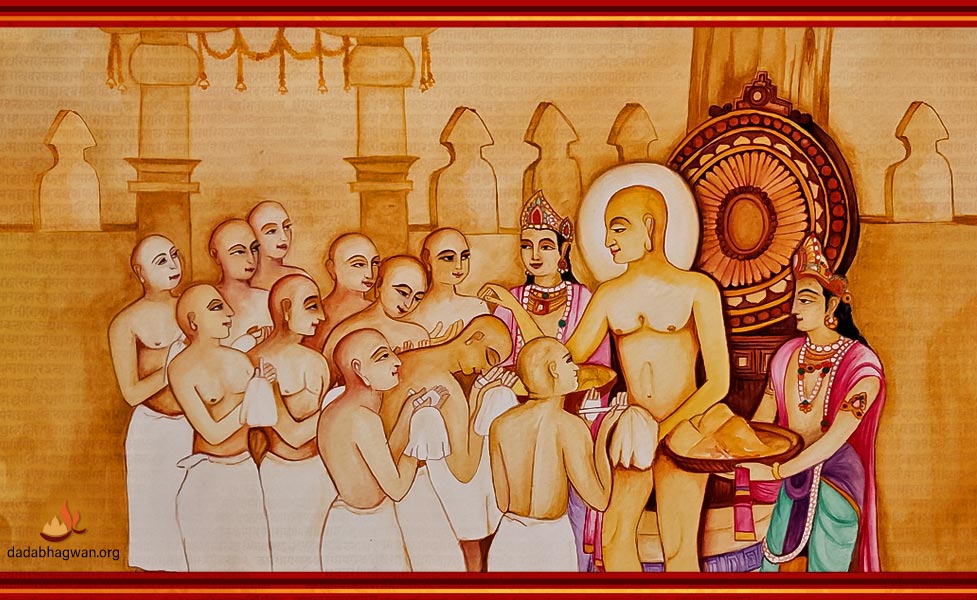
With this, all 11 Brahmins became the Gandhars of Lord Mahavir. Also, Chandana took Diksha from the Lord, and thus, became the first female monk in His shelter. The Lord established the Chaturvidh Sangh comprising of Sadhus (male monks), Sadhvis (female monks), Sharavaks (male householders following spirituality) and Shravikas (female householders following spirituality).
Deshna
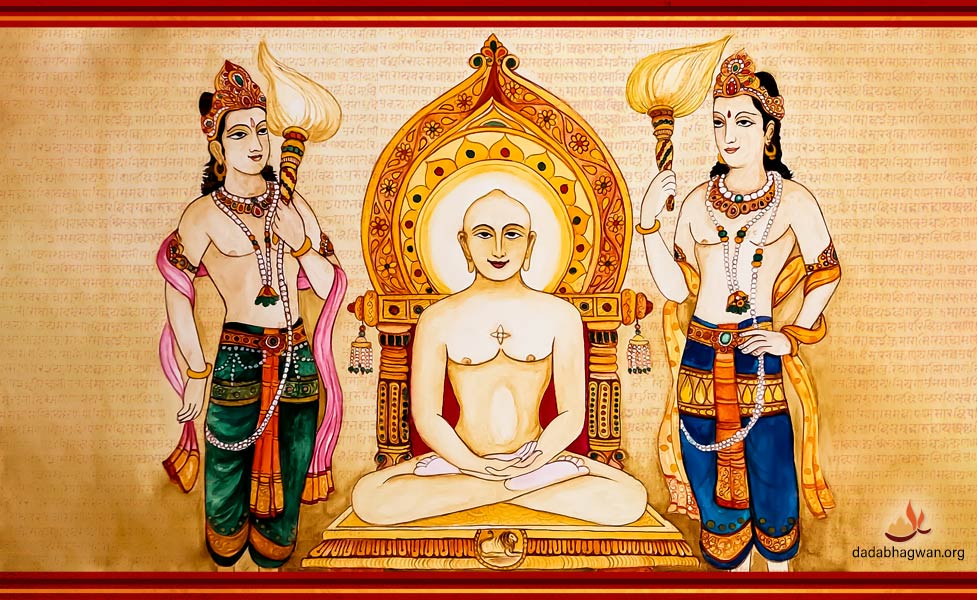
In His Deshna, Tirthankar Mahavir explained the six eternal elements that the Universe is comprised of.
- Aatma Tattva
- Jad Tattva
- Dharmastikay
- Adharmastikay
- Akash Tattva
- Kaal Tattva
Each of these eternal elements has:
- Dravya meaning substance of an element.
- Guna (pronounced as goon) meaning properties, which are also permanent.
- Paryay meaning phases, which arise, remain for some time and pass away.
Principally, all these elements inherently are always pure, and so are their dravya, guna and paryay! These elements, no matter how close they are, remain separate just like oil and water and never lose their purity. Therefore, the Soul has always remained pure, despite of it taking countless births in various life forms. It was, it is and shall always remain pure! Lord Mahavir enlightened people about these facts through His Deshna.
Peace and harmony prevail in the entire environment where a Tirthankar Bhagwan is giving Deshna. Be it animals or humans, everyone comes to listen to Him. There is no barrier of language in His speech. Hence, everyone can understand Him. His power of speech is such that it not only brings in enormous changes within a person but also makes many developed Souls attain Keval-Gnan. Let’s pray that we, too, get to hear Tirthankar Bhagwan’s speech live, in Samosaran, soon!
The Five Great Vows (Mahavrats)
Mahavir Swami gave five great vows (Panch Mahavrat) that each spiritual person is required to follow. He was established in these five vows completely. These vows are:
- Ahinsa, which means non-violence.
- Satya, which means truth. ‘Sat’ means eternal truth. There are six eternal elements in this Universe. However, Soul is the Self. Hence, it is an element of paramount importance, and therefore, ‘Soul’ is the only ‘Sat’ element. All other truths are relative truths, i.e., they are dependent on something else. ‘I am a child’ is a relative truth with respect to our parents. With respect to spouse, ‘I am a child’ is not a true statement, is it? A relative truth should be short, sweet and beneficial with respect to the other person. We must always bear in mind that a relative truth is always subject to change. Therefore, there must never be any undue insistence for any relative truth.
- Achaurya, which means a vow to not steal through thoughts, intentions, actions, and speech.
- Aparigrah meaning non-possession. Our body, mind and speech are our primary possessions. Thereafter, our spouse, children, family, home, furniture, relationships, name, fame, insults, etc. are all our possessions. Possession means anything that captivates our attention. We come into this vow in its true meaning when even dehadhyas, i.e., the belief of ‘I am the body, the relative self’, goes away. Spiritually, renouncing the outer possessions is not relevant, but renouncing the attachment to these outer possessions is what that counts. When we experience no worries at all, that’s what the state of Aparigrah is!
- Brahmacharya, which means celibacy. Lord Parshvanath had given four vows only (other than Brahmacharya) because Brahmacharya is already included in Aparigrah. However, Lord Mahavir added the fifth vow of Brahmacharya. This is because He knew that the ordinary humans of the coming era will not be able to grasp the difference between Aparigrah and Brahmacharya. Thus, they will misuse it by saying where has the Lord mentioned anything regarding Brahmacharya. To prevent this misuse, the Lord added the fifth vow.
Thief Rohineya
Near Rajgrihi, there lived a very clever and dangerously brutal thief named Lohkhur. He and his wife Rohini had a son named Rohineya. Rohineya, following his father’s footsteps, grew up to become an even more intelligent and smarter thief than his father. As years passed by, one day the old Lohkhur was on his deathbed. He called for Rohineya and advised him to never listen the preaching of Mahavir, as His teachings were not conducive to their profession. Rohineya promised his father that he would always abide by his advice.
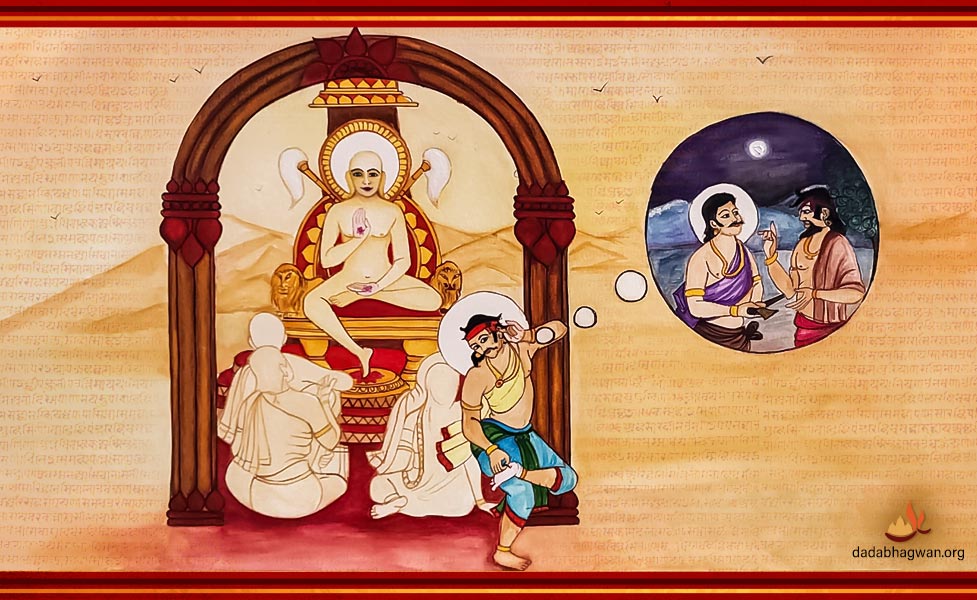
Now, one day, it so happened that while Rohineya was passing by, he heard the Lord’s voice. The Lord was giving Deshna (sermon given by Tirthankar) to the people of Shravasti. Rohineya immediately shut his ears with his hands. But just then, a sharp thorn pierced into his foot and caused him great pain. The circumstances so happened that he was forced to take at least his one hand off the ear to pull out the thorn. As soon as he did so, Lord Mahavir’s following words fell into his ear, “One whose feet do not touch the ground, one whose eyes do not wink, one whose body does not perspire and one in whose neck the garland does not wither, such a person is a celestial being.” Rohineya immediately removed the thorn from his foot and moved on.
Rohineya was on his stealing spree as never before. As a result, the people of the city experienced a lot of harassment. They requested King Shrenik to take some action against Rohineya. The King called his most intelligent and reliable Chief Minister, Abhaykumar, and gave him the charge of arresting Rohineya.
Abhaykumar placed his soldiers at critical points and succeeded in nabbing Rohineya. However, the thief was in disguise. So, when put to trial, he introduced himself to be a farmer of a neighbouring village. The King called for verifying his identity from the said village. Rohineya always thought two steps ahead, and hence, had already made prior arrangements. Consequently, the soldiers returned with a confirmation that the said identity was true. Abhaykumar was well-aware that this person was Rohineya, but could not nail him without proof of his identity. So, he created a smart plot.
He made him drink so heavily that he fell unconscious. When he regained consciousness, he saw himself in heavenly surroundings. He was not able to make out where he was. So, he asked one of the girls about it. The girl replied that he was in heaven and he was entitled to all these pleasures; but before that, he needed to narrate his deeds of his previous life. Rohineya was in doubt. Just then, he remembered what he had heard from Lord Mahavir’s sermon about heavenly beings. He looked around and found that everyone’s feet were touching the ground, their eyes were blinking like human beings, their bodies were perspiring and few flowers in the garlands, too, did not seem to be so fresh. This helped him to conclude that this heaven was not real. He sensed the trap and got off scot-free.
Now since he was free, he was in the constant awe of the Bhagwan’s sermon. He thought, “How powerful and amazing the Lord’s words are!!! I just listened to one sentence, that too out of compulsion, and it saved my life. If I listen to Him more often, I will gain a lot from Him. It could even save me from this vicious cycle of birth and death, who knows?!” His heart was filled with remorse when he reflected how he missed out listening this divine speech for so many years. He rushed to Mahavir Swami and very humbly asked Him, “Oh Lord, do I deserve to come to your refuge? Can you accept me as your disciple?” The Lord gave him the consent to do so.
He made him drink so heavily that he fell unconscious. When he regained consciousness, he saw himself in heavenly surroundings. It seemed as if he was in Devlok and there were a lot of celestial nymphs around him. He asked one of the celestial nymph where he was. The nymph replied that he was in heaven and he was entitled to all these pleasures; but before that, he needed to narrate his deeds of his previous life.
Mahavir’s First Parents
One day, Vardhamana Mahavir arrived in the village of Rushabhdutt and mother Devananda who had first conceived Him. Samosaran was set up and the couple came to listen to the discourse of the Lord. Unaware that the Lord was their son whom they had conceived earlier, they were greatly pleased to see Him. Bhagwan gave Deshna (divine speech) in which He said, “In this world, both happiness and unhappiness are temporary. Eternal happiness is found only in our Soul. Therefore, our life’s prime goal should be to attain the experience of the Soul.’ Listening to this Deshna, Samkit (Samyak Darshan) occurred to His parents!
Jamali, His Son-in-Law, and Priyadarshana, His Daughter
Mahavir Swami Bhagwan, while on vihaar, once arrived at His birthplace, Kshatriyakund. His brother Nandivardhan visited the Lord along with the Lord’s daughter, Priyadarshana, and son-in-law, Jamali. His discourse inspired the couple to renounce the world and take Diksha from the Lord. After few years, Jamali came and asked Bhagwan whether he, along with his disciples, could move to a different place and do sadhana. However, Bhagwan remained silent. Assuming His silence to be His consent, Jamali left with his group.
Once Jamali suffered from malaria. He was feeling very weak. So, he advised his disciples to get his bed ready. After some time, he checked with his disciples whether his bed was ready or not. The disciples said, “Yes, the bed is ready.” When Jamali went and checked, the bed was still getting ready. So, he asked his disciples why they lied. The disciples said that Lord Mahavir has taught us that any task that is happening is considered to have happened.
Jamali went to the Lord and sought clarification on the matter. The Lord affirmed that based on the principle of ‘karan-karya (cause-effect)’, anything that is happening can be said to have happened; it cannot be considered as a lie. For instance, if one is boarding a taxi in Mumbai and is on the way to Ahmedabad, and then someone calls home asking for this person, his wife would say, “Oh, he has gone to Ahmedabad”, wouldn’t she? Although he has not reached Ahmedabad, it can be said that he has gone to Ahmedabad as the effect of reaching Ahmedabad has already started coming into fruition based on the cause (intent) made.
However, Jamali was not convinced by the Lord’s reply. He insisted that the Lord’s viewpoint was wrong, and his was right. Hence, he defied the Lord and left Him. One should never doubt the words of the Lord. This incident is a good illustration of how one generally gets deviated from the path of liberation. No matter how many respectful practices and penances one may have done, if one is unable to trust the Lord, everything is futile for liberation.
Therefore, Param Pujya Dada Bhagwan always said, “The ladder, through which you rise upwards, you should never try to cut it.” The One through whom we have gained real knowledge and progressed (could be our Guru, Gnani or Tirthankar Bhagwan), we must never see His faults. Even if we see just one fault of the person from whom we attained knowledge, we get wrapped in such dark veils of ignorance that we lose the right vision. One who wants to go to Moksha and hence get rid of all karmas is not permitted to see anyone’s faults, not even that of a layman. Then, how can we see the fault of someone through whom we have risen, through whom we have gained something really invaluable in life?” Yes, we have full right to ask questions and resolve our doubts, and it may happen that we take more time to understand something. But to defy the Knowledgeable One, and instead walk according to our own understanding is called Swachhand. Where there’s Swachhand, one cannot go to Moksha. Swachhand can go by following the Aagna correctly and sincerely.
Jamali’s wife Priyadarshana, the daughter of Lord Mahavir, too walked out with her husband. However, after a few years, it so happened that Priyadarshana was at a place where a potter, aware of how she had left her father, tried to open her eyes so that she could go back into the shelter of Mahavir Swami. He silently put a burning coal on her saree. In a few moments, when Priyadarshana saw that her robe was burning, she shouted, “Oh, I’m burnt, I’m burnt.” The people present there put off the fire. Then, the potter asked Priyadarshana, “You and your husband are of the belief that only after a task is fully completed, can one say that it is done. Then how could you yell, “I’m burnt, I’m burnt” well in advance? You could say that only after you are totally burnt. Whatever is happening, how could you say that it is done – this is your principle, isn’t it?”
Priyadarshana realizing her mistake, surrendered into the feet of the Lord and confessed her mistake. As a result, she procured Devgati (birth in the celestial world) in her next birth.
Tejoleshya
One day, Bhagwan Mahavir arrived in Shravasti Nagri. His disciple, Anand Muni, on his way to meet the Lord, passed through a shop of a potter named Haalahala, where Goshala (we talked about him earlier) was residing. The arrogant Goshala had now also started proclaiming himself to be the 24th Tirthankar. Before Anand Muni, he boasted about having great powers due to which he could burn anyone in a moment.
Anand Muni shared this information with the Lord and enquired whether what Goshala said was true. The Lord affirmed that he has the knowledge of Tejoleshya with which he can burn anyone. However, it cannot burn a Tirthankar, i.e., Lord Mahavir! The Lord cautioned Anand Muni and his other disciples to beware of Goshala who could abuse this power anytime. He advised them to not get into any kind of argument with him.
On the other hand, in the city of Shravasti, two people claiming to be the Tirthankar had become the talk of the town. The faith of those who considered anyone of the two to be their Guru naturally flowed in that Guru’s favour. So, those who believed in Mahavir were sure that He was the real Tirthankar. However, many amateurs got impressed seeing the miraculous powers demonstrated by Goshala and mistook him to be the Tirthankar.
One day, Goshala came and started abusing the Lord left, right and centre! The Lord remained unperturbed and patiently listened to whatever Goshala had to say. However, His disciples, who adored and admired the Lord heartily, could not tolerate such bad words for Him. They retaliated due to which Goshala even more furious. He immediately threw Tejoleshya and burnt two disciples. The two took refuge into the lotus feet of Lord Mahavir, and on death, left for heavenly abode.
The other disciples present on the scene, aghast at Goshala’s cruelty, requested the Lord to bring back life in the two disciples. The Lord explained to them that He could not do so, as He was not Jeevan-daata (one who gives life) but Moksha-daata (one who gives ultimate liberation).
Life or death is a result of our own karma. God never interferes in this. Moreover, each one of us has been through countless of deaths and rebirths. Of what value is it as compared to progressing on the path of Moksha (liberation forever from the cycle of birth and death)? The two disciples whom we claim as ‘died’ actually took refuge in God and progressed on their journey towards final liberation. That’s what really matters!
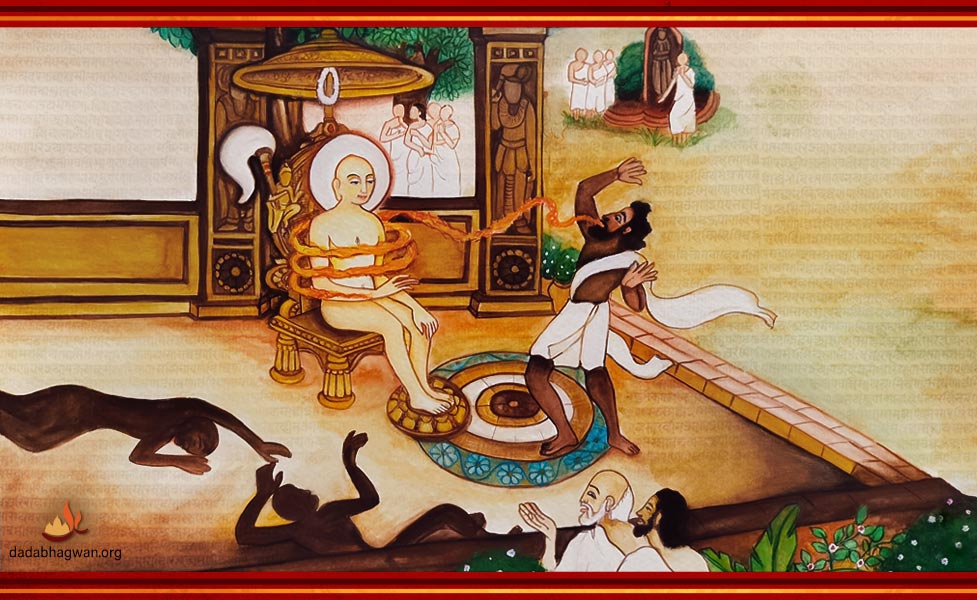
Goshala was, however, not contented with the happenings so far. He threw Tejoleshya onto the Lord too. But Bhagwan Mahavir was a Tirthankar, hence He was charam shariri, meaning He can never undergo untimely death, He is entitled to attain Nirvana only. As a result, there was no impact of Tejoleshya on the Lord. On the contrary, the Tejoleshya took three pradakshinas around Lord and returned back to Goshala and entered into his body. His entire body started burning. Bhagwan told him, “Beware, on the seventh day, you will die.” Listening to this, Goshala realized his wrong-doings and sincerely repented for them. He cried out in pain, “This terrible suffering is due to my own sinful doing.” He gathered all his disciples and admitted: “I was wrong and Bhagwan Mahavir was correct. You all go to Him. Acknowledge Him as God! I am a great sinner. Please forgive me.” He repented strongly. What did that result in? After his death, Bhagwan announced, “Goshala, because of his pratikraman, has achieved heavenly abode (Devgati). On the last day, he repented extremely due to which he set himself free of sins. Rightly or wrongly, he was always attached to Bhagwan. So, he would surely attain Moksha.” So, you see, there is tremendous power in true confession and repentance. If done heartily, it can burn away the worst sins!
Although the Tejoleshya aimed at Mahavir was unable to kill Him, it certainly affected Him adversely. It caused dysentery, as a result of which, the Lord lost a lot of weight. However, Bhagwan was at peace within. His disciples were greatly worried; especially, one of them named Sinh was heavily sobbing away seeing the Lord’s suffering. Bhagwan calmed him and said, “Don’t worry. Nothing is going to happen to me. I will be alive for another fourteen years yet.” Sinh insisted that the Lord should take some medicine, to which the Lord agreed. He asked him to go to Revati, who out of great devotion for the Lord, had been preparing some recipe for the Lord. Lord Mahavir specifically instructed Sinh to not bring that particular recipe, but instead bring the other recipe of bijora (a type of vegetable) that she had prepared for her home.
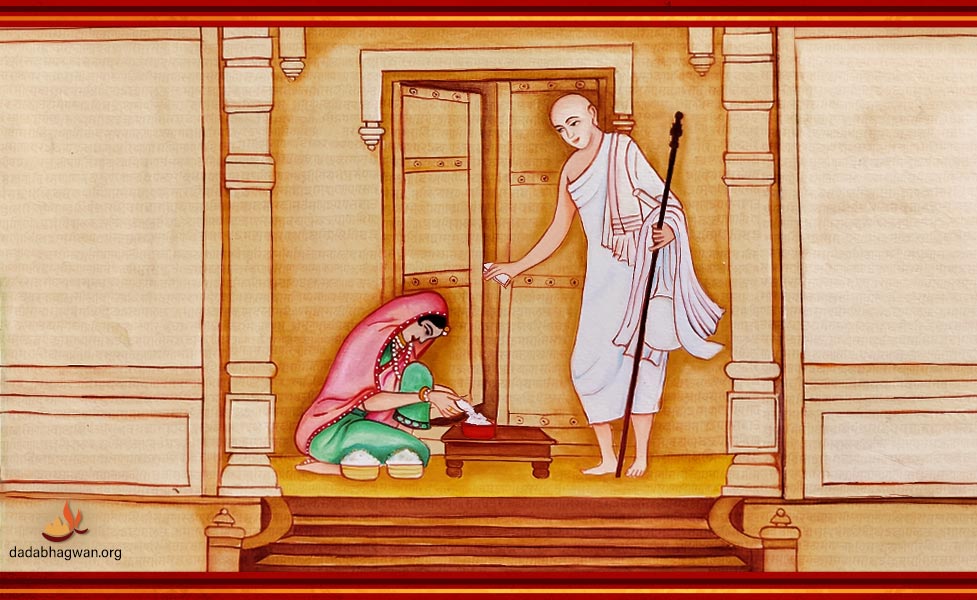
Sinh went to Revati. She was surprised and even more, thrilled and overjoyed, when she heard that the Lord had specifically asked for her prepared dish. She gladly gave away the bijora recipe to Sinh, as instructed by the Lord! Mahavir Swami ate it and got cured. Thus, Revati secured herself the state of a Tirthankar. Revati shall be the 17th Tirthankar in the next set of 24 Tirthankars (chovisi).
Param Vinay of Gautam Swami
In the shelter of Lord Mahavir, Gautam Swami’s false pride disappeared. He became an absolute humble student of the Lord! And as days passed by, he developed extreme attachment (prashast raag) towards the Lord too!!! Gautam Swami’s love for Lord Mahavir knew no bounds; and this was the very reason why he couldn’t attain Keval Gnan, while hundreds and thousands of other people attained Keval Gnan by just listening to Lord’s words once.
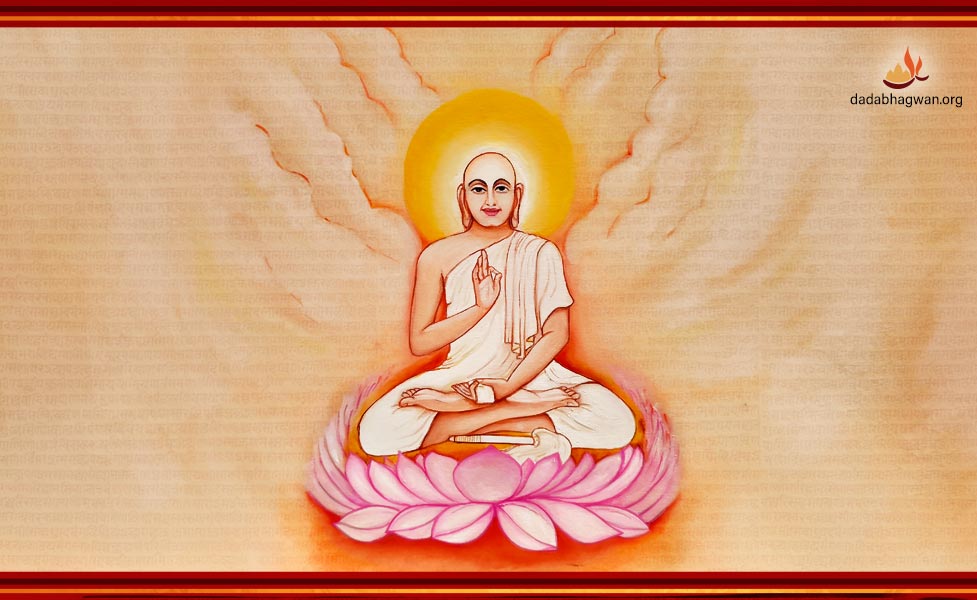
Gautam Swami was extraordinarily brilliant. So anyone whom he preached religion, through his preaching they would attain Keval Gnan, such was his potential.
Once, Mahavir Bhagwan said in his Deshna, “One who does the Darshan of the temples of the twenty-four Tirthankaras, located on the Ashtapad Mountains, and does an overnight stay there, would surely attain Moksha in the very same birth.” Listening to this, Gautam Swami decided to visit the Ashtapad and accordingly made all the necessary preparations for it. Climbing the Ashtapad was a tough ordeal indeed, however Gautam Swami was after all the first Gandhar and his determination power was tremendous.
While climbing onto the Ashtapad Mountains, there are three stations that come their way. Near the first station, Gautam Swami preached knowledge (bodh) to 500 Saints and they all surrendered unto Lord Mahavir. Near the second station, Gautam Swami preached beautiful knowledge (bodh) to the other 500 Saints too, who were in penance, and they all also surrendered unto Lord Mahavir. Near the third station also, he preached knowledge (bodh) to yet another 500 Saints and they all surrendered unto Lord Mahavir. Accordingly, 1500 Saints became disciples of Gautam Swami.
Thereafter, Gautam Swami reached the peak of Ashtapad Mountain and there, he bowed down before the twenty-four Tirthankaras and worshipped them with great devotion. Gautam Swami spent one night there and the next day, when he climbed down the mountain, the 1500 disciples, while accepting the shelter of Lord Mahavir, took Diksha from Gautam Swami. Then, with great pleasure, they all travelled along with Gautam Swami. On the way, Gautam Swami helped the 1500 Saints break their respective fasts of 2-days (chhathh) and 3-days (athham).
And thereafter, along with Gautam Swami, the 1500 Saints left for Bhagwan Mahavir’s Samovasaran. 500 of these, who had just finished their 3-days fast, the moment they did the Darshan of the Samovasaran when still at a distance, all of them attained Keval Gnan there and then. The other 500 saints who had completed their 2-days fast attained Keval Gnan as soon as they came closer to Samovasaran. And the remaining 500 disciples attained Keval Gnan upon seeing the face of Lord Mahavir.
Thereafter, the 1500 saints bowed before Lord Mahavir and as they were about to be seated in the area meant for the Keval Gnanis, Gautam Swami, unaware of the fact that all 1500 had attained Keval Gnan, stopped them. Just then, Bhagwan Mahavir tells Gautam Swami, “Oh Gautam, these 1500 saints are being offended by you, they have already attained Keval Gnan” Hearing Lord’s words, Gautam Swami, with heartfelt repentance, asked for their forgiveness. Such was his extraordinary absolute humility! Equally strong was his love and absolute humility towards the Lord!!!
Bowing our head with folded hands before our elders is a sign of humbleness. Bowing down in the feet of God denotes further humbleness. And Param Vinay (Absolute Humility) means oneness with the Guru or the Enlightened One, through whom we have attained the right Knowledge, and not having a single negative thought for Him ever. Our upliftment is to happen through Him only. Param Vinay means there is always oneness with the other person, there never occurs any separation. Its mentioned in our scriptures too, “Humbleness is the foundation of religion.” On the path of Vitaraag (fully Enlightened detached Souls), there’s a lot of significance of this humbleness. It begins with humbleness and finishes with absolute humility.
Sulsa Shravika
One day, a Shravak named Ambad came to Tirthankar Mahavir who was on his way to Rajgrihi. The Lord sent along with him His special blessings for Sulsa Shravika. The Shravak was surprised to see this coming from the detached Lord (Vitrag Bhagwan). He wondered why would the Lord do so? So, he tried to test Sulsa’s devotion towards Bhagwan. He had some powers with which he set up an illusory Samovasaran. Thereafter, he spread a rumour in the town that, 'Mahavir Swami has arrived', listening to which, the local crowd rushed towards the Samovasaran.
However, Sulsa did not move out of her home. Ambad asked her, “Would you not go to do darshan of the Lord?” She revealed, “If really Lord Mahavir would have been arriving, I would instantly feel the vibrations. My entire body would be dancing with happiness. However, as these feelings are absent in me, it suggests that this Samovasaran is an illusion, and not a reality.” The Shravak realized how wrong he was in suspecting her sincere worship. Sulsa later bound Tirthankar gotra in that birth, and as a result, shall become a Tirthankar in the next set of 24 Tirthankars.
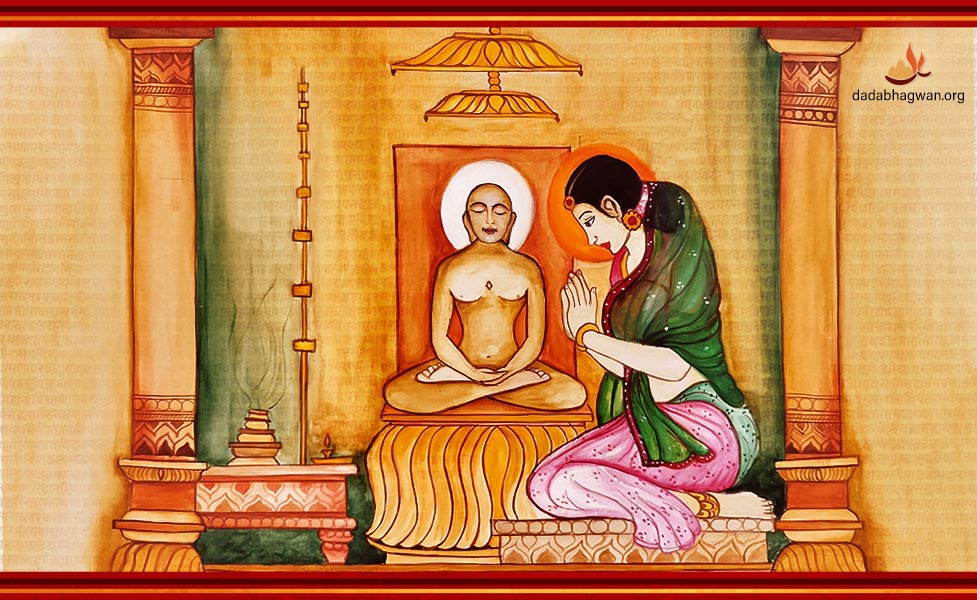
The Living Tirthankar
One day, Vardhamana Mahavir was meditating in a garden, near the temple of Mallinath Bhagwan. One couple came there, as a part of their daily routine, to do puja in the temple. The two passed by the Lord and went into the temple to worship Lord Mallinath. Seeing this, Indra Dev appeared before the couple and informed them that who they saw meditating in the garden was Bhagwan Mahavir, the present Living Tirthankar. He explained them the significance of worshipping the Living Tirthankar and how our salvation shall happen through Him.
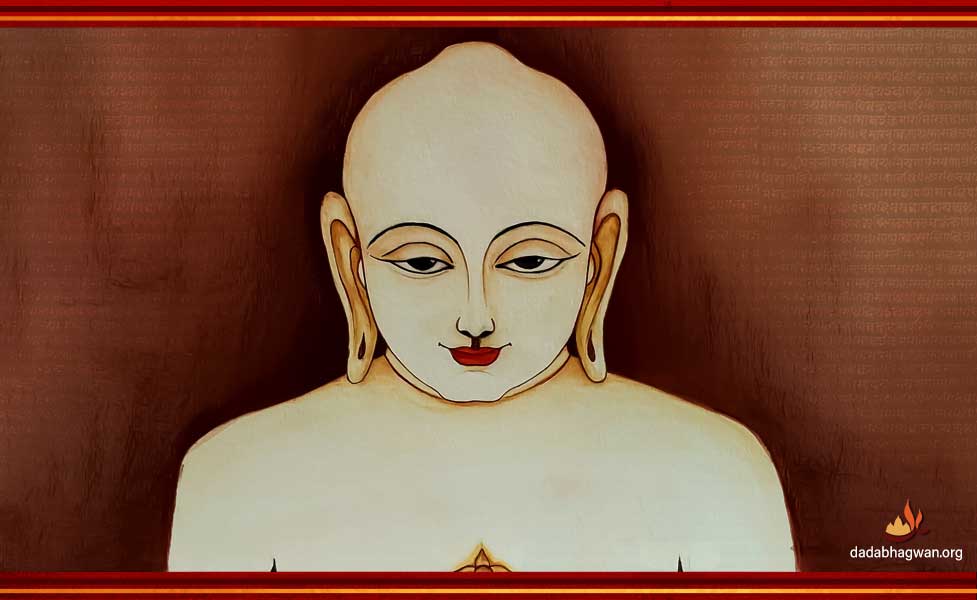
Similarly, for us, currently, the 20 Tirthankars present in the Mahavideh Kshetra are the present Living Tirthankars; Simandhar Swami being the closest to our Earth. So, we ought to worship Lord Simandhar Swami with all our heart. It is through Him that we have a great chance to attain Keval-Gnan, and finally, attain salvation at the earliest. At present, after Mahavir, there is no Tirthankar on our Earth. To reach Simandhar Swami residing in the Mahavideh Kshetra, we need His representative who is a living Gnani, the Enlightened One who enlightens our Soul and prepares us such that we can go to Simandhar Swami in our next birth.
Mahavir Nirvana
Mahavir Swami, while on vihaar, reached Pavapuri (in Bihar) near Rajgrihi. His final Deshna took place that went on for 72 hours non-stop! This was the last opportunity for the people of this time cycle to attain salvation. So, many Kings took Diksha and countless more adopted Shravak and Shravika dharm. In the middle of the session, the Lord directed Gautam Swami to go and enlighten a Brahman in the neighbouring town.
Finally, the Lord performed Shaileshikaran kriya and took His last breath at the age of 72 years. He attained Nirvan and moved to Siddha Kshetra! The celestial Gods came to perform the last rites and celebrated the Nirvan Kalyanak of Lord Mahavir.
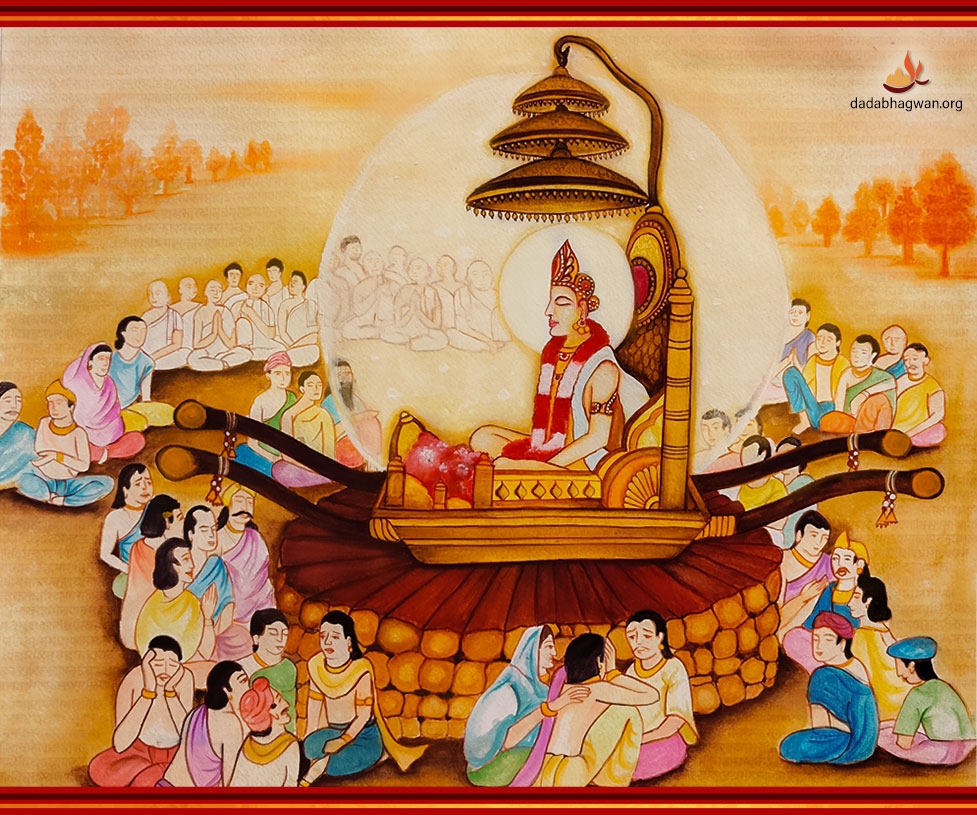
Listening to this news, the entire world was enveloped in darkness. Therefore, people lit diyas (lamps) to have the last glimpse of their Bhagwan! This practice continues even today to commemorate the last Tirthankar of this era - Mahavir Swami, our Saviour, in whose Shaasan we are born today. We celebrate this event as ‘Diwali’!
On His way back, Gautam Swami learnt that his beloved Lord has attained Nirvan. Gautam Swami, being overly attached to the Lord, was shocked to hear this news. He was unable to believe it. He failed to understand, “When the Lord knew this was going to happen, why did He send me away?” He sobbed heavily. However, just then, He realized his folly; the bondages of His attachment broke and He, too, attained Keval-Gnan! He continued with the jagat-kalyan work assigned to him by the Lord for the next 12 years and finally attained Moksha.
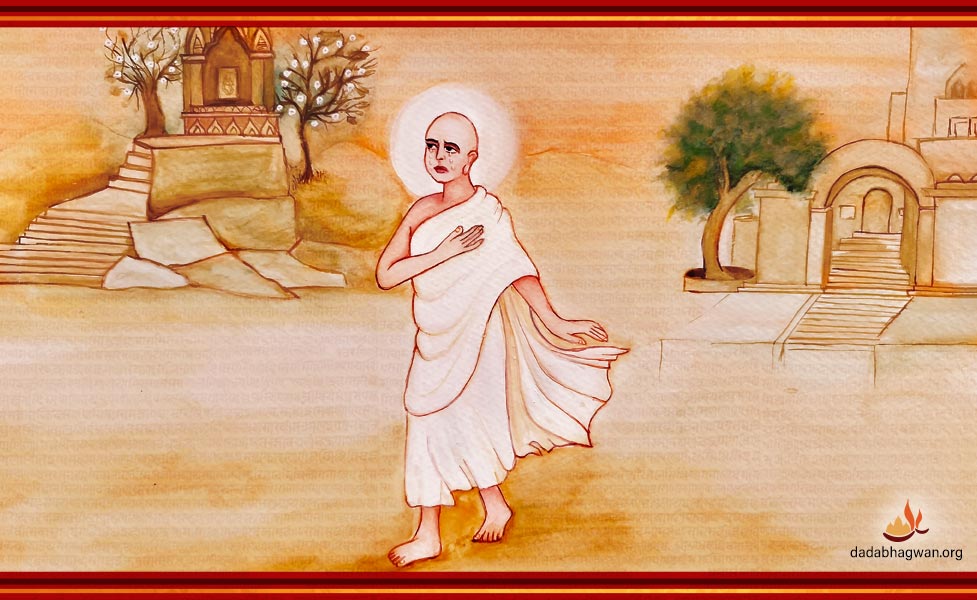
In today’s times, the life story of Mahavir Swami is of great significance to all of us! It inspires us to set a goal of becoming one like Him, non-violent and totally detached from all bondages. This is the main intention behind narrating His story. It is a natural rule: The qualities that we appreciate begin to blossom in us too. That is the whole purpose behind reading the stories of great men. Bhagwan Mahavir’s story is of a Tirthankar, the greatest state one can hold in this world!
subscribe your email for our latest news and events





